|

photo - mw
_______________________
Autumn of the Lonely
Georg Trakl
Translated by Glenn Wallis
Ovenbird
meditation, language, poetry
Dark autumn returns full of fruit and bounty,
Golden luster of beautiful summer days.
A pure blue alights out of a fallen hull;
The flight of birds resound from ancient sagas.
The wine is pressed, the mild silence
Suffused with the quiet answer of dark questions.
(....)
Soon stars will nest in the brows of the weary one;
In cool rooms a silent modesty returns
And angels step quietly out of the blue
Eyes of the lovers, who suffer more softly now.
The reed breathes; a boney horror attacks
When the thaw drips blackly from barren fields.
...(more)
_______________________
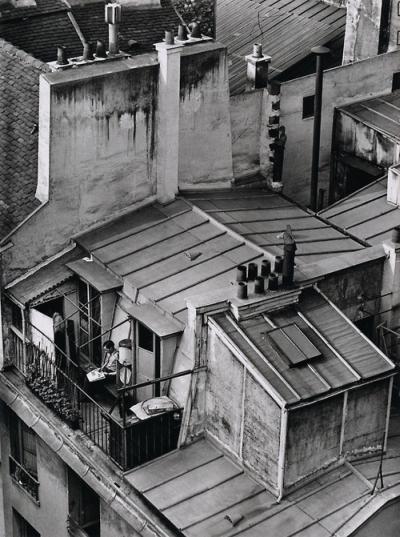
Latin Quarter, Paris
1926
from On Reading
André Kertész
via arsvitaest
_______________________
from NINE 1-45
Anne Tardos
Peep/Show
22
You see how interchangeable and reversible how pliable delicate.
The keyboard's keys are the tentacles of the matrix.
The fractal pattern of which we are a part.
The human body as a cumbersome and genial vehicle.
Nobody enjoys being tossed overboard suddenly and without warning.
Flaubert to Sand: l'homme c'est rien, l'oeuvre c'est tout.
The human being is nothing, the work is everything.
Another way of saying ars longa, vita brevis est.
And here is the ninth line, not saying much.
...(more)
Peep/Show
....A Taxonomic Exercise in Textual and Visual Seriality
.... Issue # 2 - The Carnival
_______________________

(The Premature Burial)
Harry Clarke
Illustrating Poe #3
John Coulthart
{ feuilleton }
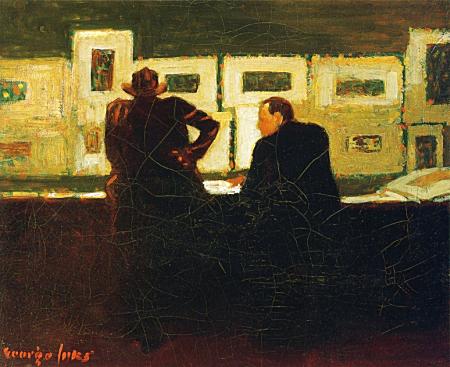
The Chapman Gallery
George Luks
d. October 29, 1933
_______________________
Collaborators with Reality
Joshua Corey
(....)
The question for writers now, it seems, is whether to join Shields [Reality Hunger] at the barricades of the lyric essay and memoir; to fight a residual action, harkening back to the heroic artifice of authenticity that bears the name of modernism; to write genre fiction (more popular than ever); or to surf the wave, captured by no single authorial identity, finding opportunity in crisis without yielding too quickly to cynicism, curmudgeonliness, or the reality bandwagon.
My intuition suggests, however, whatever paths open or close to individual writers in the next twenty years, that collaboration - in myriad forms - is here to stay, and will be at the center of art's vitality going forward. For artists themselves now assume the role of the "pieces of reality" that compose what continues to be the most compelling and versatile legacy of the twentieth century: the collage....(more)
_______________________
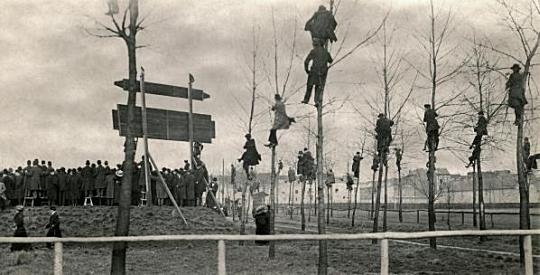
People shinned up trees
watching a soccer match
1913
Nationaal Archief's Photostream
Nationaal Archief of the Netherlands
Flickr
via arsvitaest
_______________________
Climate Change Evidence
NASA
Climate change facts, for what that's worth
Fred Clark
Regarding the facts of climate change -- and also any other similarly oft-rejected set of facts that cannot reasonably be denied -- the denialists can be grouped into three broad categories: 1. The honestly uninformed or misinformed; 2. The liars; and, 3. The deluded.
(....)
There are a host of different cognitive frameworks and strategies for denying undeniable facts. In general, most of these involve some model or construct -- religious, superstitious, ideological, economic, academic, conspiratorial -- that cannot adapt to unwelcome facts and thus provides various mechanisms for avoiding or denying them. Some of these mechanisms can be quite effective, but none is wholly automatic. They all require effort that cannot be wholly unconscious. They all require, in other words, that the deluded play a somewhat active role in their own delusion.
It's usually helpful to identify which model or construct you're dealing with when trying to free someone from this form of bondage, but that shouldn't be your main point. You don't need to tailor the facts to accommodate their ideology or framework -- the point is that their ideology or framework will have to accommodate the facts....(more)
_______________________

Portable radio in a straw hat
1931
Nationaal Archief's Photostream
_______________________
Five Zombie Economic Ideas That Refuse to Die
John Quiggin
Theories, factual claims, and policy proposals that seemed dead and buried in the wake of the crisis are now clawing their way through the soft earth, ready to wreak havoc once again.
Five of these zombie ideas seem worthy of particular attention and, if possible, final burial. Together they form a package that may be called "market liberalism," or, more pejoratively "neoliberalism." Market liberalism dominated public policy for more than three decades, from the 1970s to the global financial crisis. Even now, it dominates the thinking of the policymakers called on to respond to its failures....(more)
_______________________
Why the Politicians with the Most Dangerous, Wrong Ideas Are Probably Going to Win the Congress
Shaken by an assault on their assumptions, many Americans become more adamant in defense of discredited ideology.
David Sirota
_______________________
People of Intensity, People of Power:
The Nietzsche Economy
Diedrich Diederichsen
Translated from the German by Gerrit Jackson
e-flux
(....)
... the phenomenon we are interested in here is this: a society in which intention and focus are on top and intensity and wastefulness are at the bottom—also existing, perhaps, on the romantic margins of leisure, of bohemianism and puberty—is being reshuffled into a society where all these relations are reversed. And if we accept that this is a social fact, we can describe this development in terms of a larger diagnosis of the transition from Fordism to post-Fordism, from a society of discipline to one of control, as the victory of artistic critique as described by Boltanski and Chiapello, or in terms of the much-touted ideas of the artist as entrepreneur and of the creative cities in which the creative class allegedly leads a life that is as creatively intense as it is economically productive and successful.
Yet these diagnoses rarely account for how such transformations are framed in the experiences of those they concern, which are also the diagnoses these people use to make sense of these experiences. And in fact, these diagnoses often reveal how the structural transformations they describe have not truly entailed a migration of the old subversive lifestyles from the margins and the bottom of society to its center and to the top; rather, they often describe cases in which intensity and experience are at stake in name only, in which the values have actually been shifted only from one place to another—in order not to preserve them but to betray them, to use them as pure decoration. In other words, the familiar and slightly paranoid tropes of cooptation and assimilation are very often mobilized to prove that capitalism has not yet choked on the values of its opponents or antagonists. Measured against their original meaning, as this view has it, these resistant values themselves fall by the wayside.
My point, however, is not that these diagnoses are entirely wrong: it is probably impossible to draw a straight line between the structural transformation or migration of an ethical or anti-ethical, a political or biopolitical principle on the one hand, and the betrayal of such a principle on the other. Nor am I trying to prevent others from reading my own observations as further evidence for one of the overarching diagnoses I have mentioned. Rather, my intention is to reconstruct a line that leads from the attitude toward life and the self-conception of the punk and Nietzschean left to a situation in which their will to power, which has always already existed, and was always already felt as such, blossoms in a practice that is far removed from their original intentions....(more)
_______________________

Photojournalist on a mooring
in the port of Amsterdam
1911
Nationaal Archief's Photostream
_______________________
The Emancipated Spectator
Jacques Rancičre
Translated by Gregory Elliott
mediafire pdf
I am aware that of all this it might be said: words, yet more words, and nothing but words. I shall not take it as an insult. We have heard so many orators passing off their words as more than words, as formulas for embarking on a new existence; we have seen so many theatrical representations claiming to be not spectacles but community ceremonies; and even today, despite all the 'postmodern' scepticism about the desire to change existence, we see so many installations and spectacles transformed into religious mysteries that it is not necessarily scandalous to hear it said that words are merely words. To dismiss the fantasies of the word made flesh and the spectator rendered active, to know that words are merely words and spectacles merely spectacles, can help us arrive at a better understanding of how words and images, stories and perfor- mances, can change something of the world we live in.
_______________________
Late October, Herring Point
JoAnn Balingit
(....)
Now baylight lowers its body
onto the great dune’s body.
Beach grass calls to water
and dwarf pines sit on their hands.
Just as the ocean makes
its bed, the sky comes on
like a furnace. The hawks drift
higher, ashes, ashes in the air.
I rename this place Point High Time
for the world I am in love with.
Rename it for this life,
the place we all fall down.
Vinyl Poetry
_______________________
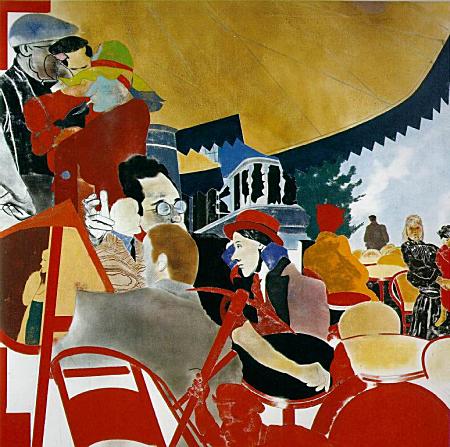
The Autumn of Central Paris
(after Walter Benjamin)
1972-3
R. B. Kitaj
b. October 29, 1932
_______________________
The Nietzsche Horse
T.R. Hummer
blackbird
There were two crazy men, the one with the whip and the one with the huge
moustache: they were dancing together, no, they were fighting
When the eyes of the whipless one brightened: sometimes that happens when
you bite someone, or when you’re fucking: people become disturbed
When horses fuck: to them, I think, it’s like mountains fucking: things
that big ought to keep it to themselves. The idiot man with the whip
Tore his hand away then, and hit me with the little crop—you think that hurt?
I’m a horse!—but the other man began dancing again, moustache
Covered with foam—what was that? had he run too far?—and he was muttering
in that barbaric way humans have, sounds like Bismark and German
And even the man with the whip was becoming frightened, or awestruck,
or maybe he looked like that because he was hungry, it’s hard to tell
About humans, and I was losing interest anyway, a hay wagon was passing,
it was much more interesting than the weeping man with his arms
Around my neck suddenly, or the moron with the whip—if he’d been a horse,
he’d have died at birth—moaning God, and the other suddenly
Laughing like a jackal and saying Fool, you have no notion who you’re talking to
An Interview With T. R. Hummer
T. R. Hummer at the Poetry FoundationT. R. Hummer's blog - Mindbook
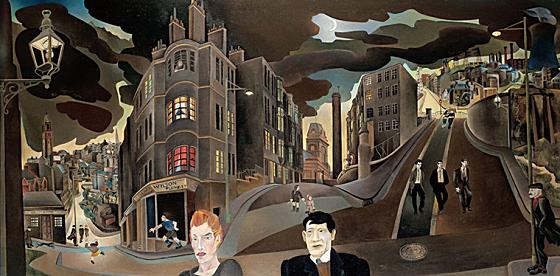
Cowcaddens Streetscape in the Fifties
Alasdair Gray: Glasgow Piranesi
Alasdair Gray: My life in pictures
via mosses from an old manse
_______________________
Lanthanum 4 [pdf]
Henry Gould
The Equalizer 1.13
Autumn is a labyrinth of earthy dreams.
Of prairie earth, grown vaster than the sea.
& Henry huddles with his traveling three -
Hobo, Roger, William B. - where the beams
of his wind-wagon meet the mast (pining).
In the cradle of his longing, the log cabin
of his ghost brought low. Some Sinbad
marathon, spun by Scheherazade (declining
favors - still, persuasive). Here, a ruddy
Irish monarch - there, an Armenian butterly.
The tale spins by itself, unstoppable top. Why?
It's gravity, at the edge of the bloody
corner, mate. Checkmate. Crossroads.
Where husk of Siberian cicada meets
the tracks, & Theseus blunders blind toward
Chartres ... where Berryman hears Beethoven-chords.
.....................................................
The Equalizer 1.14 [pdf]
Featuring: Tony Tost, Maureen Thorson, Lytton Smith, Richard Deming, Cosmo Spinosa, James Meetze, Matt Cozart, Eric Unger, Janaka Stucky, Cody Walker, Katherine Factor, Matt Hart, Buck Downs, and Jim Behrle.
published by Michael Schiavo and hosted by Maureen Thorson
_______________________

Hands of Jean Cocteau
1927
Berenice Abbott
RECOLLECTION
30 Years of Photography at The New York Public Library
via nypl's tumblr page
_______________________
Love and Theft
Olivia Cronk
“What have you done with all your words & gaudy language hats?”
-
Lara Glenum
I do not believe that only poets read contemporary poetry, but I do believe that all curious and serious readers of contemporary poetry are reading to steal. We want to steal technique, mood, vocabulary, experience. All reading is stealing -- but poetry readers are going a little further, maybe, are thrill-seeking, pursuing a potentially synesthesic change of the brain.
The black fur coat I was grew forlorn
I couldn’t hide in the snow
Domestication’s velocity stunned
A docile patch of seeming clam
These yellow eyes can’t lie
-
Brenda Iijima, from If Not Metamorphic
As a poet, an engaging book of poetry gives me a sensation comparable to learning a new physical task (ballroom dancing, flip-turning while swimming laps, driving stick shift); I blatantly and shamelessly read to get information about how to write. In fact, I often want things to be more exposed. I want not only to experience the gestalt of individual effects aligned to create a piece of art, but also to see how it is done, to feel that a creator is generous enough, intellectually savvy enough, to reveal her hand....(more)
_______________________
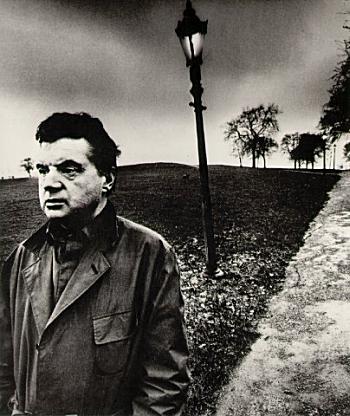
Francis Bacon
b. October 28, 1909
photo - Bill Brandt
1963
_______________________
Magic, Mysticism & Politics in Poetry:
A Few Thoughts in Response to a Note from a Friend
Matthew Landis
Abecedarian
I wouldn't advocate squelching magic. And clearly I wouldn't advocate attempting to stem the ebb and flow of imagination. I also wouldn't want to say that one person's prosody was "wrong" or "foolish". And my rejection of the idea of disciplic succession, as it were, is more about the tendency for people to latch onto their chosen poetic lineage and to narrowly define the limits of the succession. I would count the Black Mountain Poets/San Fran Renaissance as an influence on my work as well. I'd also count Conceptual Poetry/Oulipo. I'd also count Cage and MacLow. And Langpo. And the New York School. And the Metaphysical Poets. And Patti Smith. And Gertrude Stein. And the Objectivists. I think we're on the same page here, in the sense that latching onto poetic camps single-mindedly is bunk , right? I know, for instance, that while you might see yrself as part of the lineage of Black Mountain you also would never say, "Well, I don't like John Donne or Jackson MacLow or Laura (Riding) Jackson because they're not closely associated enough with the Black Mountain lineage." You would never go about attempting to tear down the work of Language Poetry or Stein or Jim Carroll in order to advance the project of continuing the Black Mountain School's influence. It's that sort of rigidity I object to in the idea of disciplic succession. Because it is a choice and it is not destiny. Which is not to say an author's choices are the first and last word, or that an author's choices are destiny. I am certainly not obsessed with the individuality of the author. I'm certainly willing to admit something of an author function, a confluence of social forces which explain certain aspects of a writer's work and I am also a BIG believer in the importance of the reader participating in the construction of a work.
(....)
I think that religion, mysticism and myth are important maps of humanity's collective experience. In a lot of ways mysticism and religion are sort of like an act of detournement; absorbing the images of the past, its time. When Benjamin wrote in his "Theses on the Philosophy of History" that each age was endowed with a "weak Messianic power" there's always been a sort of fundamental misunderstanding. It is not triumphalist, end of history rhetoric only the socialists win. That's why it's "weak". And the Messianism he refers to is fundamentally rooted in the Kabbalah's sense of Messianism—the Messiah never comes....(more)
_______________________
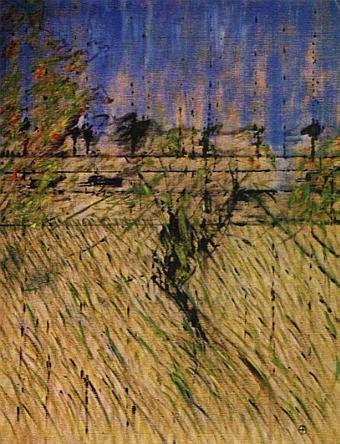
Landscape after Van Gogh
Francis Bacon
1952
_______________________
Three Stories by Gloria Frym
exquisite corpse
Burning Man
Gloria Frym
She prepares her daughter and ten other young women for Burning Man (though it is her idea of hell). Water: they’ll have to bring all they’ll use, at least 1.5 gallons per person per day. How to live in the desert (of late summer). “She’ll have a lot of (I’ve heard) sex there,” (did you buy condoms and lubricant?), “I’m told.” “She only wanted me to streak her hair green” (so why think about sex?). Baby wipes are helpful for sand in the (wrong) creased places. There be no shoots and leaves, no berries. What do they do in such a climate (under the tents)? They slather themselves with creams and oils (she shudders to give up her only child to the gods of who knows what). The nights get cold, the blankets get warm. So much music, movement, smoke, and porta-potties. Wear big skirts like native women who squat anywhere protected. Take a spade. Yet the women are travelling in an RV (it can’t fit all ten). They will stay up all night dancing (and everything else) and sleep all day in the shelter of the vehicle. Which have fans and a bathroom (though where could it hook up to water in the desert, it can’t convert sand to liquid) (there are generators) (this generation has them) (they are careful) (the birthrate is declining) they are smart (why else did their parents send them to good schools, wait-listed for better ones). They are even graduate students. Some have prepared for the LSAT, the GAMSAT, the GRE, the CBSE (why aren’t they studying instead of going off to burn an effigy) (like some cult wacked religious group Kool-Aid drinkers). They were raised secularly, by hand, tenderly fed bits of croissant before they could speak (English), protected from SIDS, took archery lessons, soccered, ballet, gymnastics, horseback riding, ice skated, yogaed, capoieraed, violined, pianoed, steel drummed, swam, snowboarded, skied, cycled (not bicycled),through their beautiful, unblemished years. (All that equipment in the closets plus helmets.) Strolled through parks, disembarked from Snuglies™ on the greenest grasses (free of chemical fertilizers) practiced walking with outstretched hands until the fall.
And what about Burning Woman? Not time yet? (Just why burn anything where the rainfall is less than an inch a year?)
When daughter returns, the basement is flooded (father and mother know how to sump pump), a hurricane causes two million to evacuate the Louisiana Coast (clearly not the place for burning a man in effigy unless the festival were retitled Drowning Man which would take care of water boarding, failure to respond) (what was GWB doing during Katrina? So close to nothing we can’t remember) (no desire to rebuild the terrible blown apart mold-ridden parts of the city the levees that hold the waters of the mighty Miss at bay) (the deserted fantastic streets once loved into real the gulf) (the local) (the language) (N’Awlins) (the people).
...(more)
_______________________
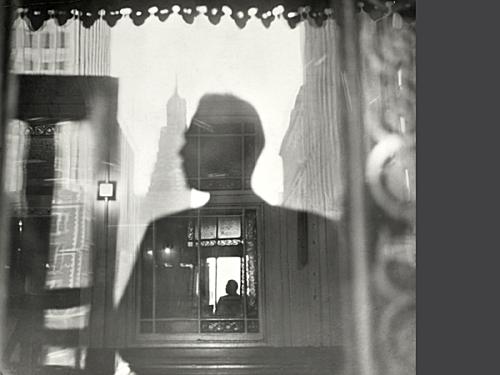
Self-Portrait
42nd Street and Third Avenue El Station
Looking Toward Tudor City
Louis Faurer
1946
RECOLLECTION
30 Years of Photography at The New York Public Library
_______________________
Any Time Soon
Gloria Frym
Little Red Leaves
THE SAID
can’t unsay the said
only say over it
palimpsest relations
stop nowhere
language slaps
welt swells
throat of the speaker
and the spoken to
forgives in time
remembers inside
the house of wrongs
the speaker writes
only want to be held
outside
the spoken to writes
a violent desire
to explode in language Little Red Leaves -- LRL e-editionsvia Poets and Writers Picnic
_______________________

The Metaphysical Wall
André Masson
d. October 28, 1987

Clan towers
Ingushetia
Ilya Varlamov
Poemas del rķo Wang
_______________________
Translating Pessoa: Winnett, Taddle, Garrison
rob mclennan
Open Book Toronto
From Garrison Creek I see the earth to the antipodes of the Universe
In this, my street is as big as any planet
Because I am the same size as what I see
And not the size of my height ever...
When Montreal poet Erin Mouré (or Eirin Moure or Erķn Moure) spent a year in Toronto as writer-in-residence at the University of Toronto, she accidentally came on to a translation project, a transelation project, on her particular Toronto lake, writing sheep. Why sheep? Started, she writes, in Providence, Rhode Island on March 20, 2000, this was Mouré writing Alberto Caeiro / Fernando Pessoa's O Guardador de Rebanhos (1946) through her translator’s gaze, and the hidden creeks that flow under her temporary Winnett Avenue location — Garrison and Taddle (the only creek, it seems, with a literary magazine named after it) — in her poetry collection Sheep’s Vigil by a Fervent Person (2001). Writing for years and collections through what it means to be a “citizen,” this project holds up as an interesting sideline to an increasingly important body of work; a fervent person who becomes, thus. As she writes in her “Notes in Recollection” at the beginning of the collection:
The anonymity of the civic grid parallels the anonymity of fields. When I was a child, I was also a bird. A bird and a fisher. Then I spent a winter on Winnett Avenue in Toronto where a small creek crosses, nameless, flowing under the road into Cedarvale ravine near the Phil White Arena. A manhole cover, the real McCoy, marks its passage. A portal, round, of fer forgé. In Montréal these covers would say Montréal égouts, or aqueduc, or égout pluvial, in accordance with their function; in Toronto they read McCoy, after their foundry. Or just bear a year. 1965. Beneath them, I started to find creeks, riding my bike that spring; for on a bike, you can hear the water. Travelling up Wychwood past the old shut streetcar barns, the sound of Taddle Creek can be followed all the way up to Vaughan Road before it’s lost. And on a bike, you’re instantly aware of topography. At night from downtown, the craggy Lake Iroquois shore just above Davenport in Toronto is a dark line: to rise out of the vanished lake into it is to enter a lung. In such a place, I first translated the words of Portuguese poet Fernando Pessoa. Or, more properly, Alberto Caeiro.
From one citizen to the next, writing out one world across another, from Roo Borson and Kim Maltman’s borrowed house in the former City of York. This is Mouré herself in translation, writing her other out of his, and finding a place where the two correspond, and even become her Pessoa-esque Eirin, before writing and collaborating with her new Galician alter-ego Elisa Sampedrķn in further collections, including Little Theatres (2005) and O Cadioro (2007)....(more)
_______________________

Beam
Michael Raedecker
Acrylic and Thread on Canvas
_______________________
Selected Recent and New Errors
Dean Young
(....)
Do you think the dictionary ever says to itself
I’ve got these words that mean completely
different things inside myself
and it’s tearing me apart?
My errors are even bigger than that.
You start taking down the walls of your house,
sooner or later it’ll collapse
but not before you can walk around
with your eyes closed, rolled backwards
and staring straight into the amygdala’s meatlocker
and your own damn self hanging there.
Do that for awhile and it’s easier to delight
in snow that lasts about twenty minutes
longer than a life held together
by the twisted silver baling wire
of deception and stealth.
...(more)
thanks to Brian Campbell
Dean Young at The Poetry Foundation
_______________________
Okey Doke
Raymond Tallis
Philosophy Now
“Okey doke” someone said the other day, getting up to go, thereby inadvertently triggering a long train of thoughts that I want to share with you. And not just thoughts, but memories. In fact, the memories may be a better place to begin. They reach back to the 1970s, when, for a few delirious months, I thought I was on the verge of understanding how language related to the world. This understanding was, of course, a misunderstanding, and, as you might expect, based on a simplification. I was, after all, doing philosophy....(more)
via This Space
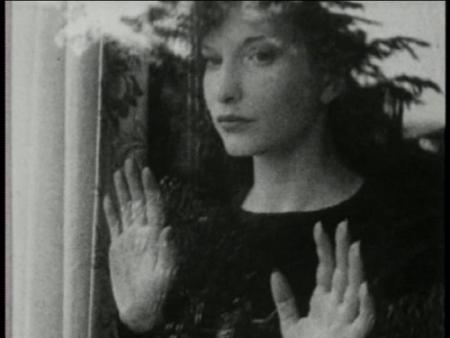
Meshes of the Afternoon
Maya Deren
(1917 - 1961)
13:28
Anagram, Gestalt, Game in Maya Deren:
Reconfiguring the Image in Post-war Cinema
Orit Halpern pmc
(....)
Throughout the late 1930s, Gregory Bateson and Margaret Mead worked in highland Bali studying culture and schizophrenia. In the interest of developing new methods for ethnography and capturing the intricacies of daily life in the villages where they worked, they created a vast archive of photographic stills and cinematic footage. To this day, their archive is considered foundational in visual anthropology. (Curiously enough, it also inspired the concept of the plateau for Gilles Deleuze and Felix Guattari.) Deren was given full access to this footage for use in developing her own cinematic practices, and the exposure to this massive visual archive brings her to encounter another form of abstraction--models of communication and game theories. This is already, therefore, a convoluted and rhizomatic history of Deren's interest in subjectivity and perception, but it has much to say about our contemporary conceptions of the image and the screen in media and film history and theory. That Deren focuses on the locus between game theories, psychology, cinema, and the ethnographic encounter is hardly a side note. I want to use this highly specific discourse of "time" in Deren's work to ask a series of questions that open onto both a history of representation and an ethics of the image: what notions of time are being specified? How might we understand the debates between an artist and an ethnographer? And between mathematical theories of computing and an ideal of art framed in temporal terms? Most importantly, what is at stake in the relationship between time and the image at this moment in Western intellectual history? Bateson and Deren do not merely intersect chronologically, but rather share a conceptual rubric within which the question of temporality as an ethical and representational problem is posed. Deren's engagement with Bateson, therefore, brings together a personal encounter and a moment in the history of western representation as theoretical machines that help situate, explore, and expand our understanding of time and the image....(more)
more films of Maya Deren
google video
Ritual In Transfigured Time
14:31
experimental films of Maya Deren
1:13:46

At Land
14:43
_______________________
Self-Portrait in a Context Mirror:
Pain and Quotation in the Conceptual Writing of Craig Dworkin
Paul Stephens
postmodern culture
Quotation marks ticked through the body of the text
like sutures arched in stitches that will scar.
But if a scar is always a citation, are citations,
themselves, always scars?
-
Craig Dworkin, "Dure," Strand
A picture is a tissue of quotations drawn from the
innumerable centers of culture.
-
Sherrie Levine, "Statement"
"I have given a name to my pain and call it 'dog,'"
announces Nietzsche in a brilliantly magisterial
pretense of having at last gained the upper hand
. . . . In the isolation of pain, even the most
uncompromising advocate of individualism might
suddenly prefer a realm populated by companions.
-
Elaine Scarry, The Body in Pain
"All minds quote," as the supremely quotable Ralph Waldo Emerson would have it--and yet not all minds quote alike at all times. Pastiche, quotation, montage, and sampling have been taken as paradigmatic gestures of the contemporary period: of the postmodern, of the information age, or of the belated era of "the end of art." This essay explores quotation and citationality in the writing of poet-critic Craig Dworkin. Dworkin's "Dure," I argue, demonstrates that an appropriative, heavily quotational poetics can enact a process of therapeutic self-critique. An ekphrastic prose poem about a Dürer self-portrait, "Dure" is a complex meditation on selfhood, the representation of pain, and the nature of linguistic appropriation. "Dure" operates by continually drawing attention to the discursive parameters by which we articulate pain. Roughly a third of "Dure" consists of direct quotation. In response to the postauthorial (and posthistorical) malaise of Barthes's the "text is a tissue of quotations", Dworkin offers a self-portrait in a tissue of quotations, enacting a writing cure, or a writing-through cure. Extensively quotational works are often associated with parody and satire-- but such works, this essay suggests, can also mourn, as well as heal, by thematizing intersubjectivity, or in Scarry's terms, by creating "a realm populated by companions". Although Dworkin elsewhere advocates a poetics "of intellect rather than emotion" ("Introduction"), I suggest that "Dure" enacts something along the lines of a return to expressive autobiography, somewhat paradoxically by way of a poetics of citationality....(more)
_______________________
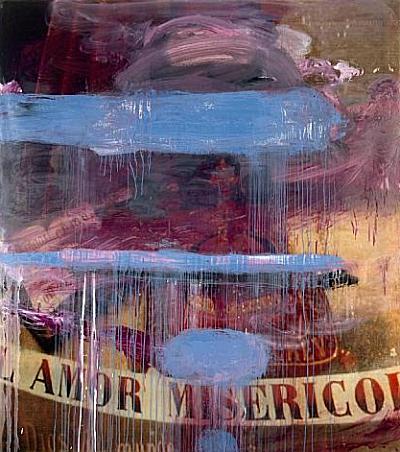
Amor Misericordioso I
2004
Julian Schnabel
b. October 26, 1951
_______________________
The South-Sea House
Charles Lamb
(....)Such is the SOUTH SEA-HOUSE. At least, such it was forty years ago, when I knew it, -- a magnificent relic! What alterations may have been made in it since, I have had no opportunities of verifying. Time, I take for granted, has not freshened it. No wind has resuscitated the face of the sleeping waters. A thicker crust by this time stagnates upon it. The moths, that were then battening upon its obsolete ledgers and day-books, have rested from their depredations, but other light generations have succeeded, making fine fretwork among their single and double entries. Layers of dust have accumulated (a superfoetation of dirt!) upon the old layers, that seldom used to be disturbed, save by some curious finger, now and then, inquisitive to explore the mode of book-keeping in Queen Anne's reign; or, with less hallowed curiosity, seeking to unveil some of the mysteries of that tremendous HOAX, whose extent the petty peculators of our day look back upon with the same expression of incredulous admiration, and hopeless ambition of rivalry, as would become the puny face of modern conspiracy contemplating the Titan size of Vaux's superhuman plot.
Peace to the manes of the BUBBLE! Silence and destitution are upon thy walls, proud house, for a memorial!
Situated as thou art, in the very heart of stirring and living commerce, -- amid the fret and fever of speculation -- with the Bank, and the `Change, and the India-house about thee, in the hey-day of present prosperity, with their important faces, as it were, insulting thee, their poor neighbour out of business -- to the idle and merely contemplative,to such as me, old house! there is a charm in thy quiet -- a cessation -- a coolness from business -- an indolence almost cloistral -- which is delightful! With what reverence have I paced thy great bare rooms and courts at eventide! They spoke of the past -- the shade of some dead accountant, with visionary pen in ear, would flit by me, stiff as in life. Living accounts and accountants puzzle me. I have no skill in figuring. But thy great dead tomes, which scarce three degenerate clerks of the present day could lift from their enshrining shelves with their old fantastic flourishes, and decorative rubric interlacing their sums in triple columniations, set down with formal superfluity of cyphers with pious sentences at the beginning, without which our religious ancestors never ventured to open a book of business, or bill of lading -- the costly vellum covers of some of them almost persuading us that we are got into some better library, are very agreeable and edifying spectacles. I can look upon these defunct dragons with complacency. Thy heavy odd-shaped ivory-handled penknives (our ancestors had every thing on a larger scale than we have hearts for) are as good as any thing from Herculaneum. The pounce-boxes of our days have gone retrograde. ...(more)
_______________________

South Sea Scheme
detail
William Hogarth
d. October 26, 1764
"South Sea Bubble"
_______________________
Algorithms and Red Wine
Is the 'digital hive' a soft totalitarian state?
Joe Bageant
... this whole business of the new hive cybernetic connectivity, could be just a swarm of data bits with no particular significance, in and of themselves, other than the magical thinking belief that they do. Which ain’t no small thing, given that what we agree upon as reality is achieved by social consensus. Hell, to some people Beelzebub still stalks the earth. To others, America is a free republic, not a company town. We all have our hallucinations.
One thing for sure. Most people in the (over)developed world think the connectivity and speed of the algorithms behind the cyberhive are worth it. Even teachers teach to a standardized test so students will conform to an algorithm, and if that ain’t hive mind, I don’t know what is.
Besides, if the worship of algorithms is not worth it, it does not matter. Whether we be Tanzanians ą la Darwin’s Nightmare, or some Stanford professor writing economic algorithms, the people who control all our lives in the globalized economic world believe they are....(more)
_______________________

7 Essential Skills You Didn't Learn in College
wired
_______________________
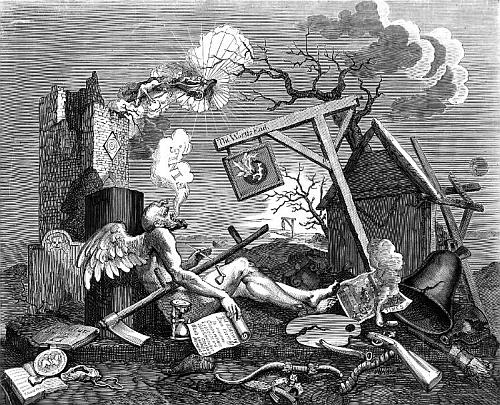
Finis, or The Tail Piece
March 1764
William Hogarth
_______________________
What do believers in the Absolute mean by saying their belief affords them comfort? They mean that since in the Absolute finite evil is overruled already, we may, therefore, whenever we wish, treat the temporal as if it were potentially the eternal, be sure that we can trust its outcome, and, without sin, dismiss our fear and drop the worry of our finite responsibility. In short, they mean that we have a right ever and anon to take a moral holiday, to let the world wag its own way, feeling that its issues are in better hands than ours and are none of our business.
-
William James, quoted by Joseph Duemer

La Ascension, Chalma
Graciela Iturbide
1984
1 2 3
_______________________
The Curse
John Berryman
Cedars and the westward sun.
The darkening sky. A man alone
Watches beside the fallen wall
The evening multitudes of sin
Crowd in upon us all.
For when the light fails they begin
Nocturnal sabotage among
The outcast and the loose of tongue,
The lax in walk, the murderers:
Our twilight universal curse.
Children are faultless in the wood,
Untouched. If they are later made
Scandal and index to their time,
It is that twilight brings for bread
The faculty of crime.
Only the idiot and the dead
Stand by, while who were young before
Wage insolent and guilty war
By night within that ancient house,
Immense, black, damned, anonymous.
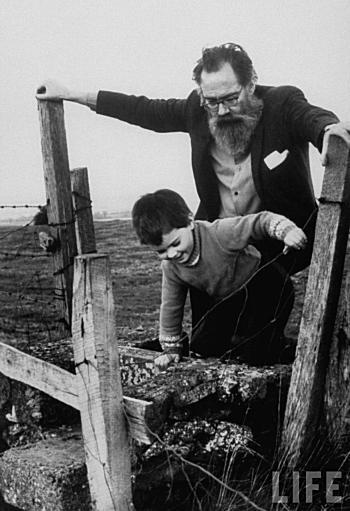
John Berryman
October 25, 1914 – January 7, 1972
with four year old daughter
photo by Terence Spencer, 1967
John Berryman, The Art of Poetry No. 16
Interviewed by Peter A. Stitt
paris review
Murder or Suicide in the Father Poems of John Berryman's Dream Songs
Jerry Williams
drunken boat
Dream Song 10: There were strange gatherings. A vote would come
John Berryman
There were strange gatherings. A vote would come
that would be no vote. There would come a rope.
Yes. There would come a rope.
Men have their hats down. "Dancing in the Dark"
will see him up, car-radio-wise. So many, some
won't find a rut to park.
It is in the occasions, that—not the fathomless heart—
the thinky death consists;
his chest is pinched. The enemy are sick,
and so is us of. Often, to rising trysts,
like this one, drove he out
and gasps of love, after all, had got him ready.
However things hurt, men hurt worse. He's stark
to be jerked onward?
Yes. In the headlights he got' keep him steady,
leak not, look out over. This' hard work,
boss, wait' for The Word.
_______________________
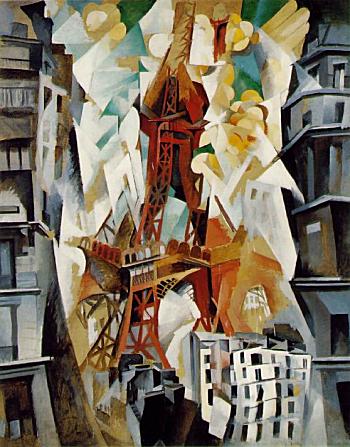
Champ de Mars: The Red Tower
1911/23
Robert Delaunay
d. October 25, 1941
_______________________
Thank God for France
Mike Whitney
Thank God for France. While American liberals tremble at the idea of sending an angry e mail to congress for fear that their name will appear on the State Department's list of terrorists, French workers are on the front lines choking on tear gas and fending off billyclubs in hand-to-hand combat with Sarkozy's Gendarmerie. That's because the French haven't forgotten their class roots. When the government gets too big for its britches, people pour out onto to the streets and Paris becomes a warzone replete with overturned Mercedes Benzs, smashed storefront windows, and stacks of smoldering tires issuing pillars of black smoke. This is what democracy looks like when it hasn't been emasculated by decades of propaganda and consumerism.(....)
Take note, Tea Party crybabies who moan about restoring "our freedoms" while stuffing the backyard bunker with seed corn and ammo. Glenn Beck won't save you from the "mean old" gov'mint. Liberty isn't free anymore. If you want it, get out of the barko-lounger and organize. The amount of freedom that any nation enjoys is directly proportionate to the amount of blood its people spilled fighting the state. No more, no less. The man who is willing to accept the blunt force of a cop's truncheon on his back is infinitely more praiseworthy than the leftist/rightist scribe crooning from the bleachers. The state isn't moved by lyrical editorials or prosaic manifestos. It responds to force alone, which is why it takes people who are willing to "throw themselves on the gears" of the apparatus and stop it from moving forward. Unfortunately, most of those people appear to live in France....(more)
_______________________
Video: French workers and students rise up
Brian Becker analyzes French workers' uprising and prospects for the U.S.
The US government spends $1 billion every two days to occupy Iraq and Afghanistan. It spends nearly $1 trillion each year for weapons and war. War is very profitable for the corporations and the bankers that dominate all parts of the economy. Meanwhile, working families are seeing their wages cut, pensions eliminated, jobs disappearing while being lectured by the same elites about the need to tighten our belt in the new “age of austerity”.
The struggles facing workers in the United States are the same as those in Europe and around the world. The bankers and politicians want to make us pay for an economic crisis caused by the bankers and corporate elites. They want us to send our young people to fight in endless wars for Empire.
_______________________
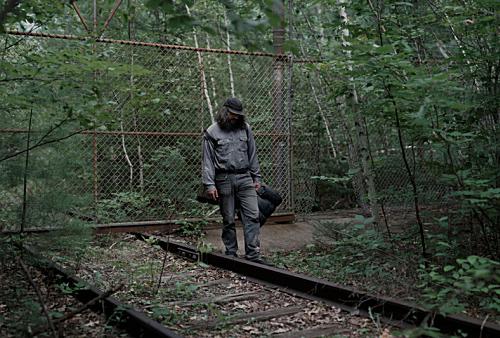
drifter
Carlos and Jason Sanchez
_______________________
Why Conservatives Love War
Corey Robin
Pithy or prolix, the case boils down to this: War is life, peace is death.
Encoded in the conservative movement's DNA, the argument for violence derives from Burke himself, specifically his A Philosophical Enquiry Into the Origin of Our Ideas of the Sublime and the Beautiful. Written long before he articulated the elements of a proper conservative philosophy, The Sublime and the Beautiful is about aesthetics, not politics. Yet Burke develops there a distinctive moral psychology, in which the self is desperately in need of negative stimuli of the sort that can be provided only by pain and danger. Some dismiss the work as apolitical juvenilia (Burke wrote it in his early 20s, and its publication in 1757 predates his entry into politics), but elements of its argument appear too often throughout the conservative canon—in Joseph de Maistre's meditations on the executioner, in de Tocqueville's memoir of the Revolution of 1848, in Theodore Roosevelt's speeches, the treatises of Carl Schmitt and Leo Strauss, Churchill's histories, Barry Goldwater's Conscience of a Conservative, and Francis Fukuyama's The End of History and the Last Man—to step past it so lightly....(more)
_______________________
So You Want Lower Taxes, a Return to Constitutional Protections and Clean Government?
Ten Questions for Tea Partiers
Ralph Nader
_______________________
We are a profoundly ignorant. People don't know anything about their own religions. We know little of our own history, let alone our history in context with the rest of the world. We worship sports heroes who torture dogs, but we point at scientists and laugh. A profoundly messed-up woman like Christine O'Donnell can run on a platform of "See? I can't manage my finances either. I'm you." We had eight years of a dry drunk as president because people thought he was the guy they'd want to have a beer with -- as if that were ever going to happen. Now there are people who would vote to give the nuclear codes to an aging high school mean girl because they'd like to fuck her -- as if that's ever going to happen. Smart people are regarded with scorn as "elites." Ignorance is regarded as a virtue.
This is how an empire dies. And we are going to be around to see it.
- Brilliant at Breakfast
_______________________
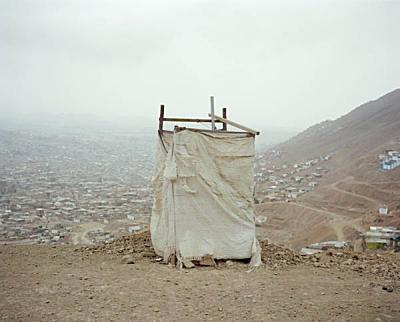
Noah Addis _______________________
The city must be a place of waste, for one wastes space and time; every-
thing mustn’t be foreseen and functional . . . the most beautiful cities were
those where festivals were not planned in advance, but there was a space
where they could unfold.
-
Lefebvre 1987
The Ludic City Exploring the potential of public spaces
Quentin Stevens ifile pdf - via aaaaarg
Why do we have public spaces in cities? What are they for? What role do they have in everyday social life? The Ludic City argues that one of the fundamental functions of public space is as a setting for informal, non- instrumental social interaction, or play. The concept of play highlights the distinctive character of urban experience: the ways people sense urban settings, move through them and act within them. Play is an important but largely neglected aspect of people’s experience of urban society, and embraces a wide variety of activities which are spontaneous, irrational or risky, and which are often unanticipated by designers, managers and other users. Focusing on the playful uses of public space, this book provides a much-needed counterpoint to the instrumental pragmatism which dominates everyday urban life and the design of city spaces. _______________________
Proposing a Taxonomy of Social Reading
Bob Stein
Institute for the Future of the Book
_______________________
Federal scientists go public in face of restrictive media rules
PublicScience.ca
_______________________
The Surrealist Vista
James Howard Kunstler
Some profound seismic infarction deep in civilization's very soul - brought on, no doubt, by the sludgy buildup of vast swindles and frauds - now propels deadly tsunamis toward the land masses where money dwells. And when they break over the shorelines of banking and capital, little may be left standing.
The latest rogue wave broke about ten days ago, when an orgy of foreclosure revealed massive irregularities in mortgage contracts and property titles, suggesting a slovenliness so arrant and broad that even the states' attorneys general woke from their narcoleptic raptures of golf to shut down transfers of distressed property. But this was only after the banks themselves declared "moratoria" in a perhaps vain attempt to forestall further discovery of their countless misdeeds. And somewhere along in there the title insurance industry had a whack attack.
During this period a new cliché issued from a million pie-holes: the rule of law. Well, as Joni once sang to we happy Boomers, "...you don't know what you got 'til it's gone...." ...(more)
_______________________

La verseuse
1916
Robert Delaunay
_______________________
Dream Song 18: A Strut for Roethke
John Berryman
Westward, hit a low note, for a roarer lost
across the Sound but north from Bremerton,
hit a way down note.
And never cadenza again of flowers, or cost.
Him who could really do that cleared his throat
& staggered on.
The bluebells, pool-shallows, saluted his over-needs,
while the clouds growled, heh-heh, & snapped, & crashed.
No stunt he'll ever unflinch once more will fail
(O lucky fellow, eh Bones?)—drifted off upstairs,
downstairs, somewheres.
No more daily, trying to hit the head on the nail:
thirstless: without a think in his head:
back from wherever, with it said.
Hit a high long note, for a lover found
needing a lower into friendlier ground
to bug among worms no more
around um jungles where ah blurt 'What for?'
Weeds, too, he favoured as
most men don't favour men.
The Garden Master's gone.

the chapel at Abu Ghraib
John Moore
dispatches / Detained
_______________________
'Intelligent Design' in the Human Sciences?
Justin E. H. Smith
... there should perhaps be a campaign to disabuse students, at some point in their teen years, of the childish view of history as a sequence of outcome-driven acts (to speak like an administrator) undertaken by exceptional individuals, where the ultimate outcome is the overall present state of the world.(....)
... what is to be fought against is a variety of 'intelligent design'. In the case of interest to us, it is the attribution of such a design to Columbus himself: a plan for the New World, for which he carried the blueprint, and which he set on its course with everything that was to come in clear view. In both cases of intelligent design, the properly scientific account of things is resisted for the same reason: because its acceptance is supposed, consciously or unconsciously, to imply meaninglessness, 'randomness' (as the kids say), disorder. In the case of history, dropping ID would require the loss of myths that likely have an even stronger hold on our understanding of ourselves than the myth of supernatural creation. How much easier it is, after all, to call upon a few sinister actors in the course of human history as an explanation of why things have gone so wrong, than to acknowledge that ethnic cleansing is simply what our species does, that it is not the result of individual moral failures, and that the chapter of it for which Columbus stands by way of metonymy is nothing exceptional. But as I never tire of repeating, there are surely more effective means of prevention than to stand slack-jawed at every new atrocity and to exclaim how exceptional it is....(more)
_______________________
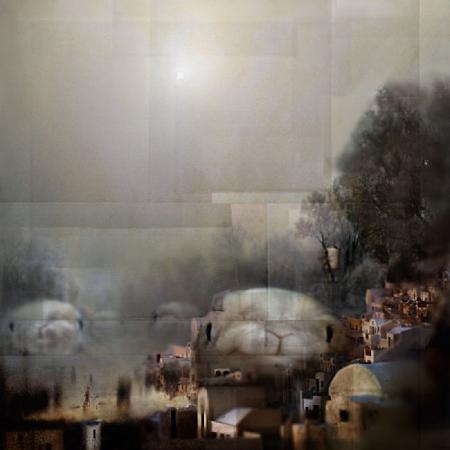
" Out Of The Woods "
Chris Berens
Roq La Rue Gallery
"Amsterdam artist Chris Berens is an anomaly in the art world, an expert painter who does not use traditional media (he uses inks on photo paper rather than oils on canvas...and NO digital or photographic elements whatsoever), but nonetheless creates compellingly executed, enigmatic, and emotionally resonant paintings."
_______________________
Fata Morgana [pdf]
André Breton
Translated by David Lenson and A.F .Moritz
This morning the mountain’ s daughter holds in her lap an accordion of white bats
A day a new day it makes me think of an object I cherish
Mounted transparently in a frame glass tubes in all the colors of philters of liquors
Which before seducing me had to serve (it doesn’ t matter) some necessity of
commercial representation
To me no work of art is worth this little sun-dappled square of grass out of sight
of life
A day a new love and I pity those for whom love decays by not changing its face
As if the carp who upon awakening hands me from the lightless pool a ringlet of
your hair
Were no more than a hundred years old and did not withhold everything that I must
not know in order to remain myself
A new day is it near you I have slept
I have slept so I’ve put on the gloves of moss
In an angle I begin to see the malevolent chest of drawers called yesterday shining
There are cumbersome pieces of furniture whose true function is to hide
the ways out
To the other side the magnetized boat who knows we could leave together
For the meeting with the tree under whose bark they say
That we are alone with ourselves one with another in the great algebra
There are some pieces of furniture heavier than if they were filled with sand on
the ocean floor
(....)
The Massachusetts Review
Autumn, 2010
via The Page
_______________________
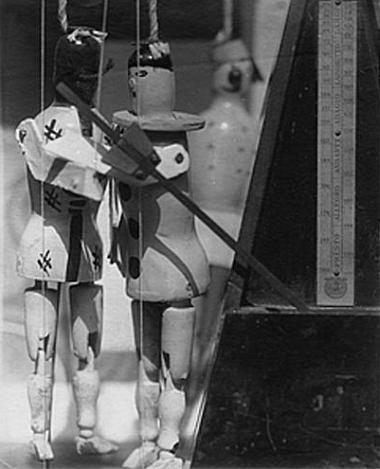
Le Metronome
1920s (ca)
Pierre Dubreuil
1872-1944
via arsvitaest
_______________________
The beginning of something
Stephen Mitchelmore
reflections occasioned by the fifteenth anniversary of Spike Magazine
I have to admit that for years I was mystified why my blog writings have gone apparently unnoticed, at least in terms of page views. While the most popular blogs were getting thousands a day, I was lucky if This Space gathered 300. I thought, isn't my review of Littell's The Kindly Ones better than almost all the others, and didn't my post on a road traffic accident say more about life's relation to literature than any journalist's exposé of an author's life? Perhaps, however, these explain why it is relatively unpopular. Anyway, I have a difficult relationship with praise and criticism, with self-effacement vying for dominance with aggressive resentment. It is probably best to write, as in those early days of Spike, as if nobody is watching. After having published a dozen or so reviews in print media, I'm nowadays genuinely happier to work for weeks on long reviews or essays and have them disappear into the gaping void. Finding a way to talk about the reading experience is, I've realised, the greatest pleasure of writing; where it ends is of no importance. Still, over the last fourteen years of online work, I've seen the names of my key writers – Thomas Bernhard, Maurice Blanchot and Gabriel Josipovici – become familiar whereas before they were marginalised. If I have had only a minor role in this, it has made the effort worthwhile....(more)
_______________________
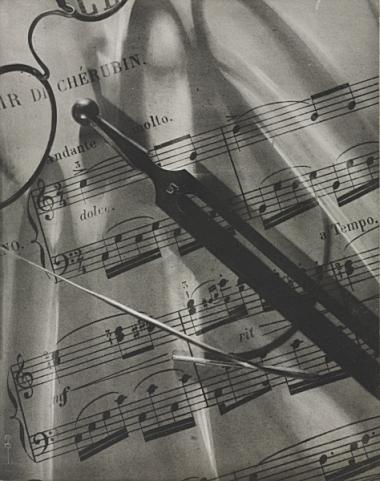
Interlude
Pierre Dubreuil
1932
_______________________
The Wentworth Hotel and Ballroom
Thomas Gough
conjunctions
Why is it that when I cross the final street before the Wentworth Hotel my eye is drawn to the weave of electric bus lines bolted with cables to the stuccoed buttresses of the retaining walls, to the concrete-based streetlamps where I have never failed, and do not fail tonight, to see the house painters in their white uniforms? And when will I cease to turn these painters into waylaid soldiers, men who strike me as AWOL, as if it were they who were pretending, as I think all of us at the Wentworth must be pretending, that we are not on the run, that we belong in our wooden chairs at the end of our iced drinks at the end of summer on the bottom of the world?...(more)
_______________________
 American Mine (Nevada 10)
The Mining Project
David Maisel
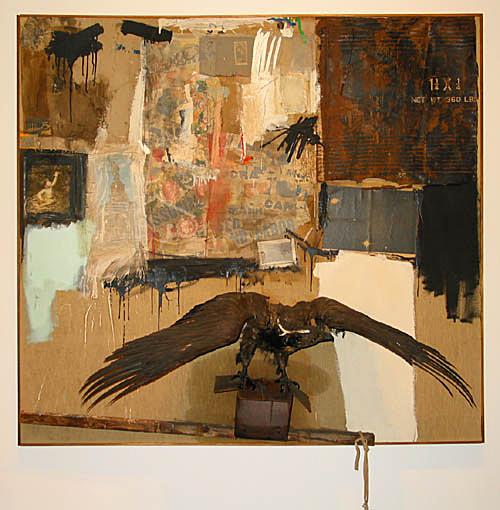 Canyon
Robert Rauschenberg
1959
_______________________
A Connecticut Yankee in the Court of Wu Chih Tien
Mark Twain and Wong Chin Foo
Hsuan L. Hsu
common-place
Connecticut Yankee and Wu Chih Tien share more than a fascination with the brutally effective use of explosives. Both novels project modern ideas and technologies into the past to counteract conventional opinions about the progressive nature of history and the socially backward status of non-Western civilizations. By doing so, Twain and Wong countered the nativist visions of white masculinity characteristic of popular romance novels featuring historical or foreign settings. Reading these novels together helps us better understand how contending visions of empire, "progress," and racial inequality were presented and debated in works of literary fiction. It also makes visible affinities between the two writers and their audiences that—in spite of Twain's career-long interest in the Chinese—neither author noted in print. As platform lecturers, humorists, newspaper editors, and occasional political activists, both Twain and Wong understood how entertaining adventure novels could sway public sentiment and politics....(more)
_______________________
The Human
A Poetics of Matter
Marcia Casey
jacket
I am seeking some rightness, something that feels true, in my own thinking and writing, and in the thinking and writing of others, about who we are and how language takes part in this. Like Finch and Elder, I look to literature to inform my understanding of human being and how we shall live. This most fundamental human question was addressed by every author I’ve read in the last year, in artful ways that ranged from the intimate to the abstract, and I’ve called them, by name and initial, into a discourse. In this critique, by seeking, sifting, selecting and ordering what these authors say about being human, and by my own thinking-with them and writing-with them in pursuit of understanding our gist, I aim to get a glimpse of the human in action, to see the outline of the human dilemma of our time, and perhaps to gain some insight on how, right now, we shall — most rightly, most humanely, through language — live....(more)
_______________________

Robert Rauschenberg
(October 22, 1925 – May 12, 2008)
_______________________
Body, remember not just how much you were loved,
not simply those beds on which you have lain,
but also the desire for you that shone
plainly in the eyes that gazed at you,
and quavered in the voice for you, though
by some chance obstacle was finally forestalled.
Now that everything is finally in the past,
it seems as though you did yield to those desires --
how they shone, remember, in the eyes that gazed at you,
how they quavered in the voice for you -- body, remember.
- C.P.Cavafy, translated by Stratis Haviaras
_______________________
Corporeal Order
Chris Martin
exquisite corpse
No balance, no right angles, no parallel lines, no circles—in effect, no geometry.
TOWARD A PROVISIONAL DEFINITION OF DISEQUILIBRIUM
(....)
Though terribly powerful as ideology, separation-by-image remains remarkably flimsy when interrogated by ontology. Separation demands a stewardship, or worse, an ownership of the body; it becomes something one has, something one must subjugate and discipline. But the body ever and always resists. The first step in correcting the false stewardship of the body is to realign the mind and body, to recognize that the mind is, in fact, the body. And vice-versa. Then the body becomes something one is. Finally, to engage the corporeal order, one must recognize the body as something one does. This institutes great personal responsibility, not to control the body, but to perform it, to access the excess and attend to the disequilibrium of the body, moving from within its latent, though thoroughly potent choreography.
Within is a word of paramount importance to the corporeal order. So is of. So is middle. The corporeal order craves terms that reacquaint one with the real. Let’s begin at the beginning of the middle. At the middle of the beginning. Already. I am beginning with the premise that it is already happening, which is concomitant to the premise that it is already changing. So let's begin with a question: what's happening?
We are compulsively ordering the world. It is a matter of aesthetics. It is a matter of choices that have been subsumed by a system of aesthetics so successful that we don't even know it exists. It is Debord’s spectacle, but a specific version of it, much older than the postmodern world. Merleau-Ponty suggests the term “reflective order.” Regardless of what we call it, it is a system predicated on the eradication of bodies. Consider disorder. In this system a disordered part disorders the whole. If we judge a part of the body as disordered, we judge the whole body as disordered. More than that, we judge the whole person as disordered. At any node on the spectrum, the key fact is that we judge. Again, it's a matter of aesthetics. Disordered parts may include race, class, weight, gait, or any of a myriad of factors. What unites them is our desire to isolate and eradicate them.
Where does this desire come from? A fiction. The oldest, most powerful, and most dangerous fiction. That one is separate. When do we learn this fiction? At the exact point we learn fiction. This happens twice. Once in a fire and once in a mirror. Then it keeps happening. Let’s start in the middle. The mirror. ...(more)
_______________________
Someone Around Here is Looking for an Equation
Dimitris Athinakis
Translated from GreekGreek by Karen Emmerich
words without borders
I listen to the sounds, in this room;
the house must be settling.
I smell me everywhere, I remember the first body.
Finger insistent, upright; wanting to speak.
I hear something, perhaps horses, running outside.
I sketch with my nail. You sit beside me and watch.
Weak stomach; dreaming of horses.
The room, the evening, drowns. I sleep.
Another body—it intervenes, watches me.
My fingernails grow; they reach the ceiling.
They break through and water gushes in, tons.
...(more)
An Interview with Dimitris Athinakis
_______________________
The Poetics of Salt
Theorizing Method and Madness
Prakash Kona
ctheory
Dark Night of the body
remember, body, how they trembled for you in those voices.
To understand salt as a material discourse of resistance and a vehicle of social change is to embrace the body as the reality in which dwells the spirit. In one of the articles "Capital Punishment" from the Dispatches for the New York Tribune, Marx comments on Hegel's statement that "Punishment is the right of the criminal" which the criminal brings upon himself. While critiquing Hegel for not "looking upon the criminal as the mere object, the slave of justice," and raising him "to the position of a free and self-determined being," Marx attacks German idealism for giving "a transcendental sanction to the rules of existing society." The poetics of salt is an acknowledgement of the fact that the exploited body is not a being with freewill of its own but one whose genius of survival is guided by a need to resist. In recognizing that the existing rules of a social order are made by people, Marx places human choices in their material condition as the basis of spiritual or ideal interpretations of reality. Resistance is the salt that goes with the logic of "by any means necessary." In his preface to Weapons of the Weak James C. Scott observes that more important than large structural changes are "what we might call everyday forms of peasant resistance -- the prosaic but constant struggle between peasantry and those who seek to extract labor, food, taxes, rents and interest from them." The politics of salt is not about changes larger than life but restricted to the nature of living -- salt is inescapably an everyday thing like life itself. Salt never abandons life to enter the transcendental zone of idealism or idealists. Salt is thus both method because it resists in a thoughtful manner and madness because it rejects the transcendental dimension of the order. ...(more)
_______________________

Robert Rauschenberg
_______________________
from: The Science of Forgetting
by Bernadette Mayer and Dave Brinks
Exquisite Corpse
Locus Pocus
look at painting
as you would in a mirror
growing backwards
giving an eye for an ear
repudiated goddess
omniscient massage librarian
anyone can become autonomic
and ne’re a thought more
daresay every intention
by which splendor arrives
petitioning the sun
west of the Himalayas
for whom yellow is blue
...(more)
_______________________
from Le Repos, dans la suite des jours
Michaėl Glück
translated from the French by Rosanna Warren
agni
55.
restrain the least gesture
this day make
a void
turn down
all invitations
keep the world
between your lips
renounce
the usefulness
of words
follow the breath
no word weighs down
don’t name anything
what is to come will come
...(more)
_______________________
Once in a dream of Meaning Meaning drifting came
into a mise-en-scene I thought Saskatchewan
or thought some extra holding up a cue-card
that said it was, as in another part of Shakespeare
We rejoice for the brown grass or simpler,
the hour itself, the first flakes named at all
because they hint of a prior fall, the prairie
white with it, the soft inviting banks
beside where the hiway is becoming inaccessible.
- David Bromige

David Bromige
October 22, 1933 – June 3, 2009
Bromige feature at Jacket
Edited by Susan Gevirtz
Poem Reading a Line by Duncan
David Bromige
If only my sense of your being vulnerable
Could reach out and enfold you
Sit across the table
Or side-by-side above a book
If only that look of yours
Someone would study
Could be before me very now
How on your serious face
The feelings trace their courses
Muscles nerves & brain
If only I were free to be that one
To witness how that face
Cracks near in two
At some diverting foolery
Smile that rises from the sorrow depths
Surrendering inevitable
Knowledge saying I accept
Time to establish this :
Not I am with you as you read
Nor I am obviously not
Won’t slight the chaos
You arose from as from Naples’ Bay
The day, another line of letters
In evening’s shadows brailed
If only the word Soppy
Would bug off & let me
Flow over to you vulnerable
This world that is terrible
Beyond all measure
And we who need a center
As a poem needs a spine
Knew & not guessed victory
But my sense of you vulnerable
That is my own stays home
Duncan my friend is gone
Who reached across me so I saw the table
Ten Poems
David Bromige
from As In T as in Tether
David Bromige: A Selection
by Meredith Quartermain
Our frequencies
David Bromige
Always excepting time,
people the most commonly employed,
a little more than water,
a little more than words.
Man more than day
and less than words.
More days than work,
more work than things,
more things than help.
Years number men.
Men name home.
More names than homes,
more men than names,
more years than men.
More sound than thought,
more thought than world.
We see more than we can make,
make more than we can find,
find more than we can use,
use more than we can know.
I have one but what there can each like him see.
Poetries of Canada
The East Village Poetry Web
special edition edited by Jack Kimball and David Bromige
_______________________

Jan Banning

The Man of the Woods and the Cat of the Mountains
1973
R. B. Kitaj
(29 October 1932 – 21 October 2007)
_______________________
Save Benjamin from his fans!
Stephan Wackwitz
sight and sign
One day, on a marble table top in an Ulm cafe, next to a cup of coffee, lay a red and white Bibliothek Suhrkamp book. It was Walter Benjamin's "Einbahnstraße" (One Way Street). The effect it was to have on me in the months and years to come echoed that experienced by it author in the 1920's, who could only read Aragon's "Paysan de Paris" one page at a time because it made his heart race and kept him awake for nights on end.
When, after flicking through it for the first time, I returned Benjamin's "Einbahnstraße" to the marble table top in the Ulm cafe (I was waiting for the local train to take me to my home town of Blaubeuren), I knew I would never be bored again. Not because I would continue to read this book for ever, a book that my professors in Munich were unable to classify as poetry or prose, theory or fiction, diary or essay. As I mentioned, I could never digest more than one or two passages in one sitting. What I mean is that something radical had happened in my life, because from this moment on, the world of books would contain something which awed me infinitely, just as I had been awed in childhood by the toys of some of my friends, or as I felt about the glamorous older female students in the German studies seminars in Schellingstraße.
My admiration for some of Benjamin's writing, the elegance of his thinking and his language more than anything else, has accompanied me throughout my intellectual life. And this in spite of the irreparable damage I probably inflicted upon myself during my period of obsessive Benjamin reading. Because the confusion of his thinking exponentially propelled my own confusions to new heights, for many years. When you read Benjamin, you must learn to strictly separate admiration and criticism.
The history of his influence is suitabably paradoxical. Benjamin's writing, which was almost exclusively intended to be scientific in method, makes strict claims to the truth, even when it takes the form of aphorism, feuilleton, literary critique or memoir. But Benjamin today enjoys the level of worldwide adoration that is otherwise reserved for poets in Eastern Europe. He is quoted so extensively, his photograph reproduced so often, he is the subject of so many prominent congresses and meticulous exhibitions that you would be forgiven for thinking he was Germany's leading poet. This misleading (oft kitschifying) treatment of a man who throughout his life regarded himself as a theorist, is most unusual for literary life in the west. At the very least it demands an explanation....(more)
_______________________
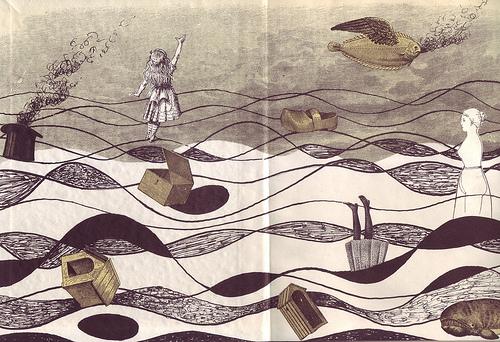 endpapers
Adolf Hoffmeister
illustrations for Lautreamont's Poesies
A Journey Round My Skull
A section from Poesies
Lautréamont
The disturbances, anxieties, depravities, death, exceptions to the physical or moral order, the spirit of negation, the brutishness, the hallucinations waited upon by the will, torments, destruction, madnesses, tears, insatiabilities, slaveries, deep-thinking imaginations, novels, the unexpected things which must not be done, the chemical peculiarities of the mysterious vulture that watches for the carcass of some dead illusion, precocious and abortive experiences, obscurities with a flea-like shell, the terrible obsession with pride, the inoculation with deep stupors, funeral orations, envies, betrayals, tyrannies, impieties, irritations, bitternesses, aggressive tirades, insanity, spleen, rational terrors, strange misgivings the reader would rather not feel, grimaces, neuroses, the cruel routes through which one forces last-ditch logic...(more)
_______________________

Wake In Progress
Stephen Crowe
_______________________
The Boatman
Steve Himmer
wigleaf
All my dreams are of water, water running with blood. Night is a logjam of blue, bloated corpses I cannot pole past. Sleep comes in a trickle when it comes at all, and most nights it leaves me behind to watch bodies batter and swirl in the eddies, never sinking or washing ashore. I have all those hours to remember their faces, their baggage and their destinations. To recall the fast chatter trailing each mouth like a wake as they boarded my boat, leaving quiet lives in Demopolis and Burnside and Cape Girardeau for bright lights upriver, Saint Louis and New Orleans and Memphis.
(....)
A dark, angry river runs through the world and I'm lost on its skin same as anyone is. I'm trying to steer, trying to stay afloat, trying to stay out of anyone's way and avoid cracking up on the banks. That feather says don't come close, don't you folks come on board; it says I'm damned to float on this river but it doesn't mean you have to follow -- there's nothing wrong with your farms, nothing wrong with your towns, nothing upriver worth going to see. There are fakers and failures same as anywhere else only more of them because fresh loads of the lost are washed in all the time....(more)
Wigleaf via riley dog
Steve Himmer edits Necessary Fiction.
_______________________
A Left-Handed Commencement Address
(1983)
Ursula K. Le Guin
b. October 21, 1929
Success is somebody else's failure. Success is the American Dream we can keep dreaming because most people in most places, including thirty million of ourselves, live wide awake in the terrible reality of poverty. No, I do not wish you success. I don't even want to talk about it. I want to talk about failure.
Because you are human beings you are going to meet failure. You are going to meet disappointment, injustice, betrayal, and irreparable loss. You will find you're weak where you thought yourself strong. You'll work for possessions and then find they possess you. You will find yourself - as I know you already have - in dark places, alone, and afraid.
What I hope for you, for all my sisters and daughters, brothers and sons, is that you will be able to live there, in the dark place. To live in the place that our rationalizing culture of success denies, calling it a place of exile, uninhabitable, foreign....(more)
_______________________
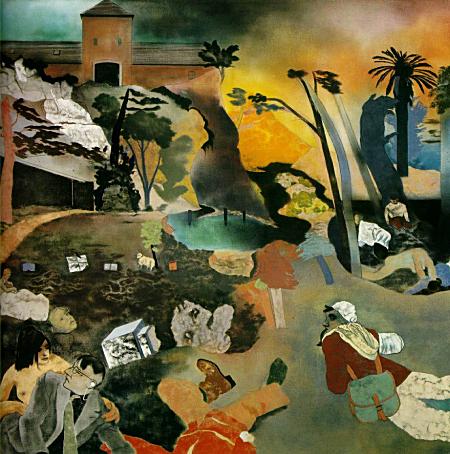
If Not, Not
R. B. Kitaj
1975-76
Second diasporist manifesto
(a new kind of long poem in 615 free verses)
R. B. Kitaj
google books
_______________________
Merleau-Ponty on Bodily Intersubjectivity
Dylan Trigg
Side Effects
...the tendency of philosophy in its response to the problem of other minds, from Mill to Hegel, has been to employ the other as a vehicle to reinforce the “I,” rendering the other a variation of the self. This egocentric view on others maintains a focus on the personal horizon of phenomenal life, it thus treats others as appearances in that realm, and that alone. Merleau-Ponty’s genius is to account for the existence of the other through an appeal to the “hither side” of the human body, an anonymous, prepersonal realm that ultimately confuses the distinction between self and other....(more)
_______________________
‘Outlines of a world coming into existence’:
Pervasive computing and the ethics of forgetting
Martin Dodge and Rob Kitchin
scribd
Abstract
In this paper we examine the potential of pervasive computing to create widespread
sousveillance, that will complement surveillance, through the development of life-
logs; socio-spatial archives that document every action, every event, every
conversation, and every material expression of an individual’s life. Reflecting on
emerging technologies, life-log projects and artistic critiques of sousveillance we
explore the potential social, political and ethical implications of machines that never
forget. We suggest, given that life-logs have the potential to convert exterior
generated oligopticons to an interior panopticon, that an ethics of forgetting needs to
be developed and built into the development of life-logging technologies. Rather than
seeing forgetting as a weakness or a fallibility we argue that it is an emancipatory
process that will free pervasive computing from burdensome and pernicious
disciplinary effects.
via Mark Thwaite
_______________________

Vilho Lampi
1935
Weimar
more
_______________________
the blue rental
Barbara Mor
ctheory
(....)
Piezophiles PsychroCryophiles Lithoautotrophs
Metalotolerants a black well cesspool pozo negro pitch lake
liquid asphalt (La Brea 38,000 years oldest material wood
or bone) wolves bison horse groundsloth turtles snails fish
millipede lion tiger mammoth dead bones the animals
struggled here no way out no air microbes bacteria
archae the ancestors live here
it was a story existence 4.54 billion years
microscopic particles ofNothing become something on their
dark sides required to make Worlds methane ammonia
hydrogen + electric spark and watched itself walk into such
proliferation the phenomenon called life it multiplied
itself carbonic acids water nitrogenous compounds it
could be Extreme to manifest imagination from Itself as
slimemold moves over and over dung or rot to make a film
grotesque minuscules selfreplicate as if 2 lovers out ofOne
as plants or Echiniscus may reproduce themselves lizards
Daphnia fungus worm our ancestors the precursors in their
dying varieties
and what evolved into them not a crime but
fascination with their crime
Homo faber hands on cave walls red black ocher
charcoal fixed with animal fat where water trickles from
rock a painted wound earth makes beautiful things (no
the first mirror before Egypt Ur a still pool the gaze of water
where they met the Other the shiningHunter the first zoo
was here dark gallery of primal beasts desired by the eye
they too looked back at other beasts blind luminal beasts
mining ore from their flanks and udders we watch we want
what they killed they loved with attention iron manganese
lightning ash the chemistry of thought and their metalurged
hands amazing hands brains as pistons grinding everything
down into final dust as if heroic waste lavish waste as if
endlessly prolific as the starry letters or genetic code
...(more)
Barbara Mor, Oasis 1 2 3
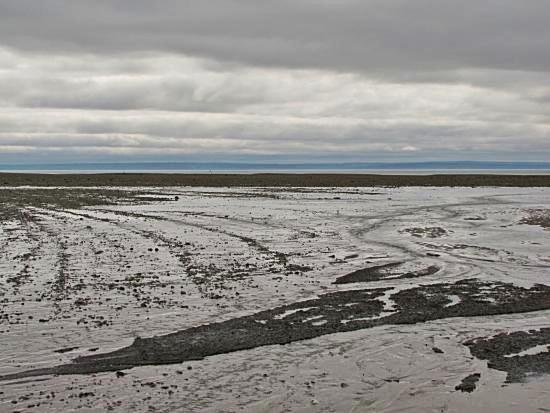
photo - mw
_______________________
Ulysses among the Fundamentalists (3)
Habib Tengour
translated and presented by Pierre Joris
In the afternoon, after they had finished reading the report on morality, he discreetly left the conference to walk down to the beach. He knew well that the congress was important — a historic moment! — that his presence meant a lot; he was not only there as a symbol. “How to get out of this, given the context?” Smaļn had asked him brandishing the invitation. Yet Smaļn was less engaged than he was. This was the first public demonstration after years of clandestinity. He had put up with and supported this party through many difficult moments. And now he could no longer put up with their speeches. Wind! In private discussions he admitted that his attitude may shock certain of his friends; it was however of no consequence as far as the political situation was concerned. You couldn’t hope for anything from anybody. He had never thought that he was indispensable and felt certain that on this count he was right. So much needed to be done in so many domains and there were so few means. So little time, too. You had to grab the maximum of the latter in order to live. He scoffed at his own lamentations, felt them to be fake too. What was all this? A masked ball! How to penetrate souls? Answer the questions? Deliver oneself. Be at peace.
(....)
On the promenade he made mental notes in order to make the brilliance of the day manifest and fix it in his memory more securely than by writing: “Superb weather!” “What a drought” “Summer persists, o ochre season, Happiness.” Tranquility, a cristalline space.” Gull time.” “Aquatic fervor, sweat.” “Alone, a siren…” “The sea sings” “The long legs satin-sheened in the black marvel of the stockings and love on the run sets fire to the austere dwellings of the tribe” “For long, the obscure blemish” “The line is pure when I bend over” “An ancient desire bursts forth… On the Cape, Ulysses wept. Ithaca evil. Each day sitting in the same spot as if immortality had no price. ...(more)
Parts 1 and 2_______________________
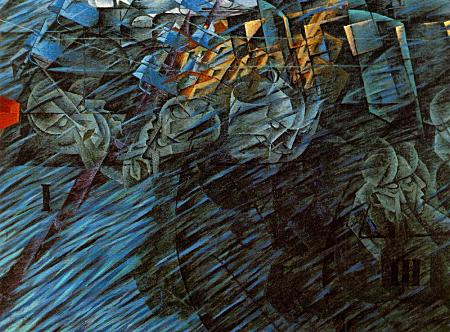
States of Mind: Those who go
Umberto Boccioni
1911
_______________________
Variations On Robert Frost’s “after Apple Picking”
Norman Fischer
*
The long ladder
Or the road, perhaps
The sea that bends
Under its own weight is not
So real as heaven above,
Air beyond the top of my head –
Apples
Hold me to earth
More lumpy still
With each step up I take
Till I practically disappear
Looking through the tines of a fork
The pesky woodchuck could not tell
He is barren of birches
Like a mongoose or a prancing
River otter he’s furtive
In his need so slinks
In corners or margins
Holding me back
With his sharper apron strings
Till I can’t not sit still
*
...(more)
zen monster
_______________________
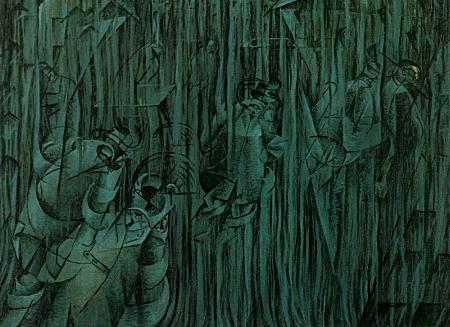
States of Mind: Those who stay
Umberto Boccioni
1911
_______________________
On the Absolute, the Sublime, and Ecstatic Truth
Werner Herzog
(Translated by Moira Weigel)
The collapse of the stellar universe will occur—like creation—in grandiose splendor.
-
Blaise Pascal
The words attributed to Blaise Pascal which preface my film Lessons of Darkness are in fact by me. Pascal himself could not have said it better.
This falsified and yet, as I will later demonstrate, not falsified quotation should serve as a first hint of what I am trying to deal with in this discourse. Anyway, to acknowledge a fake as fake contributes only to the triumph of accountants.
Why am I doing this, you might ask? The reason is simple and comes not from theoretical, but rather from practical, considerations. With this quotation as a prefix I elevate [erheben] the spectator, before he has even seen the first frame, to a high level, from which to enter the film. And I, the author of the film, do not let him descend from this height until it is over. Only in this state of sublimity [Erhabenheit] does something deeper become possible, a kind of truth that is the enemy of the merely factual. Ecstatic truth, I call it....(more)
via James Luckett
_______________________

photo - mw
_______________________
Open Access Week
Privilege and Property. Essays on the History of Copyright
edited by Ronan Deazley, Martin Kretschmer, Lionel Bently
Open Book Publishers
_______________________
From "Radical Extremism" to "Balanced Copyright":
Canadian Copyright and the Digital Agenda
edited by Michael Geist
Open Access online
Copyright has long been viewed as one of the government’s most difficult policy issues. It attracts passionate views from a wide range of stakeholders, including creators, consumers, businesses, and educators and it is the source of significant political pressure from the United States. The latest chapter in the Canadian copyright saga unfolded in June 2010 as Industry Minister Tony Clement and Canadian Heritage James Moore tabled Bill C-32, copyright reform legislation billed as providing both balance and a much-needed modernization of the law. The introduction marked the culmination of months of public discussion and internal government debate.
This book represents an effort by some of Canada’s leading copyright experts to shift away from the sloganeering that has marked the debate to date by moving toward an informed analysis of Bill C-32 and the future development of Canadian copyright law. Edited by Professor Michael Geist, an internationally regarded authority on Internet and technology law, it responds to the need for non-partisan, informed analysis of Bill C-32. An exceptional group of Canadian scholars from coast-to-coast have come together to assess Canada’s plans for copyright reform and the digital agenda in this timely volume that features context for the reforms, analysis of its impact on technology, business, education, and creators, as well as a look ahead to future copyright and digital issues.
_______________________
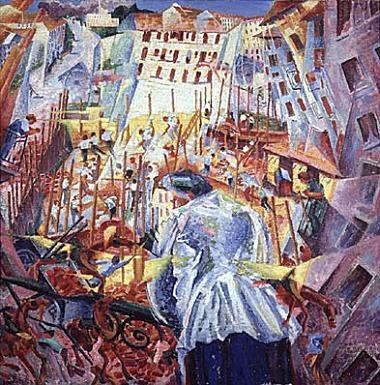
The street enters the house
1911
Umberto Boccioni
(19 October 1882 – 17 August 1916)
_______________________
Sky-Goer
Anne Waldman
zenmonster
the commentary:
“Kadro” in Tibetan means “sky-goer”. The Sanskrit
term is “dakini” and is understood as a feminine
principle that may appear as a human being, a god-
dess –wrathful or peaceful –or as the play of energy in
the phenomenal world. Tibetan Buddhism speaks of
a language described as the “the secret signs and let-
ters of the dakini”, and another which is a secret code
of tantric terminology referred to as “twilight” lan-
guage. The oral teachings are sometimes referred to as
“dakini’s breath”. An exceedingly symbolic cipher,
many volumes could emerge from very few letters.
Whole teachings are condensed into single seed sylla-
bles and hidden in the earth, in rivers, in trees in
cloud formations, or in the mind of the adept. “In
diamond rocks, in mysterious lakes and unchanging
boxes”, as one description goes. Specific practices
encourage the practitioner to join with the energy of
the dakini and unlock the runes which travel beyond
dualistic boundaries. Suffering is ego’s failure to con-
trol situations to make them “mine” and perpetuates
the fantasy of solid self which is, of course, an illu-
sion. The dakini fearlessly cuts through the static.
She doesn’t own anything. The playful dakini consorts
with you and can turn on a dime if you are too
attached. Fixation is the wrathful dakini. Here out of
hypnogogic poem-sound what might ensue: a game.
A dharma.
...(more)
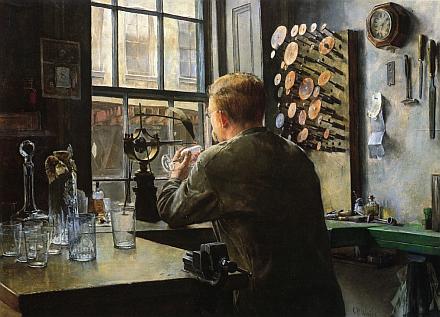 The Glass Engraver
1883
Charles Frederic Ulrich
b. October 18, 1858
_______________________
Finding Time
Rebecca Solnit
September/October 2007 issue of Orion magazine
The four horsemen of my apocalypse are called Efficiency, Convenience, Profitability, and Security, and in their names, crimes against poetry, pleasure, sociability, and the very largeness of the world are daily, hourly, constantly carried out. These marauding horsemen are deployed by technophiles, advertisers, and profiteers to assault the nameless pleasures and meanings that knit together our lives and expand our horizons.(....)
... The language of commerce has been engineered to describe the overt purpose of a thing, but cannot encompass fringe benefits or peripheral pleasures. It weighs the obvious against what in its terms are incomprehensible. When I drive from here to there, speed, privacy, control, and safety are easy to claim. When I walk, what happens is more vague, more ambiguous—and in many circumstances much richer. I am out in the world. It’s exercise, though not so quantifiably as on a treadmill in a gym with a digital readout. It’s myriad little epiphanies and encounters that knit me more tightly into my place and maybe enhance the place overall. The carbon emissions are essentially nil. Many more benefits are more subjective, more ethereal—and more wordy. You can’t describe them in a few familiar phrases; and if you’re not practiced at describing them, you may not be able to articulate them at all. It is difficult to value what cannot be named. Since someone makes money every time you buy a car or fill it up, there’s a whole commercial language built around getting us to drive; there’s little or no language promoting the free act of walking. Have you not driven a Ford lately? (....)
The conundrum is that the language to describe the ineffable splendors and possibilities of our lives takes time to master, takes a certain unhurried engagement with the tasks of description, assessment, critique, and conversation; that to speak this slow language you must slow down, and to slow down you must have some inkling of what you will gain by doing so. It’s not an elite language; nomadic and remote tribal peoples are now quite good at picking and choosing from development’s cascade of new toys, and so are some of the cash-poor, culture-rich people in places like Louisiana. Poetry is good training in speaking it, and skepticism is helpful in rejecting the four horsemen of this apocalypse, but they both require a mind that likes to roam around and the time in which to do it.
Ultimately, I believe that slowness is an act of resistance, not because slowness is a good in itself but because of all that it makes room for, the things that don’t get measured and can’t be bought. ...(more)
_______________________

Manhatta
(1921)
silent documentary
Paul Strand and artist Charles Sheeler
youtube
10 min.
_______________________
The Jigoku Zoshi Hells, A Book of Variations
Jerome Rothenberg
...not to annihilate the original but to bring it into a new dimension, where both versions can lead an independent if interlinked existence. The fifty year gap between them adds its own strangeness to the mix.
Variations On The Hell Of Measures
How can any of you know what it feels like
to count coins in Hell?
Hell has windows as the skin has numbers, & the sun flashing on the sidewalk
blinds the little customers who bathe in it.
In my head as on my flesh the poems appear, responding to my call.
My palms turn violet & blue, smoother than Chinese silk.
My room is filled with rain, as Hell with fire, while an eyebrow slightly raised
signals deceit.
The other Hells are kept in store.
A Hell of numbers follows one with rhymings.
Ribs grow heavy.
The night is meant for grief no lotions over legs or fingers can assuage.
Lost in the smoke we wait for day to come, for coins to burn the swindlers
who demand them – like a brand.
Crates pile up.
Windows break.
Death makes the mind turn white.
Hands open Hell for others.
Let its fires trap the birds who fly through them.
Let disaster make them all turn black.
Let them cry out with pain, the counters filling up with cloth in boxes, broken
open in the night, unmeasured, boxes smelling of the sea, the intellect
imprisoned in their darkness, knowing the right questions but afraid to ask.
Make it pliable like wax & let it drip over the outlaw´s cashbox.
Words have their birth in it, & metals drawn out of the earth & melted give us
coins.
The years ahead are green.
The bedposts where we rest are iron.
Our eyes are iron too & blind us.
Call it Hell.
(....)
Argotist Online E books
via Nick Piombino
_______________________

Ford Plant, River Rouge
Criss-Crossed Conveyors
Charles Scheeler
1927
_______________________
A Permanent Economic Emergency
What is the Left to Do?
Slavoj ˇi˛ek
….In the domain of socio-economic relations, our era perceives itself as the age of maturity in which humanity has abandoned the old millenarian utopian dreams and accepted the constraints of reality—read: capitalist socio-economic reality—with all its impossibilities. The commandment you cannot is its mot d’ordre: you cannot engage in large collective acts, which necessarily end in totalitarian terror; you cannot cling to the old welfare state, it makes you non-competitive and leads to economic crisis; you cannot isolate yourself from the global market, without falling prey to the spectre of North Korean juche. In its ideological version, ecology also adds its own list of impossibilities, so-called threshold values—no more than two degrees of global warming—based on ‘expert opinions’.
It is crucial to distinguish here between two impossibilities: the impossible-real of a social antagonism, and the ‘impossibility’ on which the predominant ideological field focuses. Impossibility is here redoubled, it serves as a mask of itself: that is, the ideological function of the second impossibility is to obfuscate the real of the first. Today, the ruling ideology endeavours to make us accept the ‘impossibility’ of radical change, of abolishing capitalism, of a democracy not reduced to a corrupt parliamentary game, in order to render invisible the impossible-real of the antagonism that cuts across capitalist societies. This real is ‘impossible’ in the sense that it is the impossible of the existing social order, its constitutive antagonism; which is not to imply that this impossible-real cannot be directly dealt with, or radically transformed. ...(more)
_______________________
The Shore Road
Norman Maccaig
(1910 - 1996)
The sea pursued
Its beastlike amours, rolling in its sweat
And beautiful under the moon; and a leaf was
A lively architecture in the light.
The space between
Was full, to splitting point, of presences
So oilily adjustable a walking man
Pushed through and trailed behind no turbulence.
The walking man
With octaves in his guts was quartertone
In octaves of octaves that climbed up and down
Beyond his hearing, to back parts of the moon.
As though things were
Perpetual chronologies of themselves,
He sounded his small history, to make complete
The interval of leaves and rutting waves.
Or so he thought,
And heard his hard shoes scrunching in the grit,
Smelt salt and iodine in the wind and knew
The door was near, the supper, the small lamplight. quoted by Andrew Motion in The Poem and the Path
_______________________

Doylestown House
Stairway, Open Door
1914-17
The Photography of Charles Sheeler
1 2
_______________________
I still think the revolution is to make the world safe for poetry, meandering, for the frail and vulnerable, the rare and obscure, the impractical and local and small, and I feel that we’ve lost if we don’t practice and celebrate them now, instead of waiting for some ’60s never-neverland of after-the-revolution. And we’ve lost the revolution if we relinquish our full possibilities and powers.
Interview with Rebecca SolnitThe Believer
(....)
THE BELIEVER: I’ve seen you referred to as an art historian, a landscape writer, and an art critic, if not more. How do you consider your own work and writer’s identity?
REBECCA SOLNIT: In Wanderlust, I wrote, “This history of walking is an amateur history, just as walking is an amateur act. To use a walking metaphor, it trespasses through everybody else’s field—through anatomy, anthropology, architecture, gardening, geography, political and cultural history, literature, sexuality, religious studies—and doesn’t stop in any of them on its long route. For if a field of expertise can be imagined as a real field—a nice rectangular confine carefully tilled and yielding a specific crop—then the subject of walking resembles walking itself in its lack of confines.” I have a very clear sense of what I am here to do and what its internal coherence is, but it doesn’t fit into the way that ideas and continuities are chopped up into fields or labeled. Sometimes I say I’m an essayist, because that’s an elegant, historically grounded—if sometimes trivialized—mode of literature, while nonfiction is just a term for the leftovers when fiction is considered to be paramount, and creative nonfiction is even more abject a term.(....)
That term public intellectual: all I know is that I stayed home alone for almost two decades, writing, before it became oddly visible and audible. Oddly, because it came out of silence and introversion, but it’s useful to be able to advocate for things I believe in, if not quite what I signed up for. And I’m still spending a lot of time home alone writing. Talking to people and going places is also a part of the work, but staying home alone is crucial.
Fundamental causes of the troubles that engage me are metaphors of control, beliefs in the supreme value of convenience, efficiency, and speed, fear of the unknown, compartmentalization, moral and otherwise, and the belief that things as they are are inevitable and there’s little we can do about changing them. So a book like Field Guide is not a polemic, but in celebrating the unknown, wandering, and going beyond your limits, it is swimming upstream in the currents of our time. Of course Savage Dreams also had a lot of descriptions of beauties and pleasures; I don’t think you can or should leave those things out, and I tried to make it a pleasure to read. Pleasure can be radical. In a divided culture, being undivided and synthesizing and connecting across broad areas can be an act of resistance, just as being slow—as in doing things deliberately, walking or biking or cooking from scratch or gardening or sitting around and swapping stories, not being dilatory or sluggish—in a sped-up culture is an act of resistance akin to the work slowdowns that were one form of factory strike.
And there’s no firm dividing line between passionate political engagement and epiphany and pleasure. At the core of my writing is a desire to dissolve most of the cultural Berlin Walls running through our imaginations. After all, it was through that Nevada Test Site experience that I discovered that the sunset is just as beautiful when you’re in handcuffs, and a holding pen can be a very good place from which to watch it....(more)
Wanderlust: A History of Walking
Rebecca Solnit google books
_______________________

Home Sweet Home
Charles Scheeler
_______________________
The line is broken from all lines, which proves that there
exists no
line, and which also proves that one can regard everything
as the line,
presupposing a character that gets too involved in what
inevitably
drives it into ruin. Thomas Bernhard, The Lunatics / The Inmates
translated by James Reidel
conjunctions
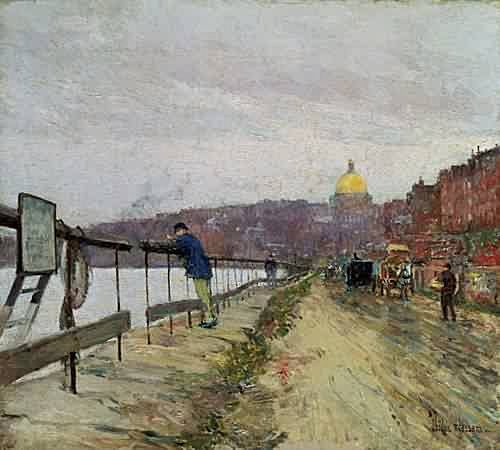
Charles River and Beacon Hill
1892
Childe Hassam
b. October 17, 1859
_______________________
I’m wondering now why I’ve always put such faith in doubt itself; or, conversely, what it is about certainty that attracts me so much that I have spent twenty-seven years, thousands of hours, and millions of other people’s dollars to repel it. What reminiscence of my own makes that lust forbidden? What drives me to recoil from the ecstasy of this audience?
Perhaps what plagues me is a private memory, of violence suffered at the hands of people unre- strained by self-doubt.
The War On Unhappiness
Goodbye Freud, Hello Positive Thinking
Gary Greenberg Harpers, Sept. 2010
scribd
Freud had come to the land of unbridled opti- mism to inform its inhabitants that a fragile equipoise between repression and abandon was the best they could hope for, and perpetual uncer- tainty their lot. The dourness of this message is probably what he had in mind when, as his ship pulled into New York Harbor, he turned to Jung and said, “Don’t they know we are bringing them the plague?”
One century and two months later, I arrive with six thousand of my professional colleagues at the Anaheim Convention Center for the Evolu- tion of Psychotherapy Conference, and when you’re fresh from the Hold Me Tight: Strengthen- ing the Bonds of Love workshop and on your way to a demonstration of Mindsight and Neural Inte- gration, when you have to decide whether you’ll learn about Imago Couples Therapy or Differenti- ating Between Onion and Garlic Clients before attending Deepak Chopra’s keynote lecture on Reinventing the Body and Resurrecting the Soul, when you can test-drive the Alpha Stim 100 Brainwave Synchronizer, it’s easy to think that some kind of plague is upon our land....(more)
_______________________
Against Happiness: In Praise of Melancholy
Eric G. Wilson
To be against happiness, to avert contentment, is to be close to joy, to embrace ecstasy. Incompleteness is the call to life. Fragmentation is freedom. The exhilaration of never knowing anything fully is that you can perpetually imagine sublimities beyond reason. On the margins of the known is the agile edge of existence. This is the elation of circumference. This is the rapture, burning slow, of finishing a book that can never be completed, a flawed and conflicted text, vexed as twilight.Performing the happy life is giving over to artifice. Enduring the sad existence is participating in life's vital rhythms. Pallid happiness is here hell, and melancholia, dark, is the way to earthly heaven.
(....)
That's finally it; happy types ultimately don't live their own lives at all. They follow some prefabiricated script, some ten-step plan for bliss or some stairway to heaven.
(....)
The problem is that these poor souls won't be aware of the source of their nervousness. They'll tend to blame others or the world, anything to keep intact the delusion that they're just find, thank you, anything to keep at bay the vicious fear eating at their hearts.
(....) ...(more)
via spurious
_______________________
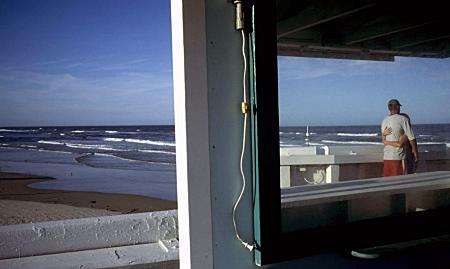
Constantine Manos
_______________________
Postscript
Robert Gibbons
Time Capsule
Times one needs distance in order to approach intimacy. Days away from
compiling endnotes, weeks from the last page of text, a myriad of minor
memories not addressed in the autobiography swirl around, enter & leave at
will. It’s not that I feel as though I’ve left anything out, it’s just that the desire
to write down one’s life lingers toward Postscript. Death is none other than
Postscript. So we write & speak, touch & love, while we can. What I know
about life is deeply enmeshed in my body as wounded & healed, experienced
traveler & sedentary reader, disciplined enough to postpone pleasure & Hell-
bent toward the erotic. Each facet contributing to the joy of written language.
I’m no hero. Dreams & desires, however, sometimes come true. I don’t
forget the ten years during which my desire to write equaled the inability to
do so....(more)
Time Capsule is a bi-weekly series at The Killing Floor featuring the writing of Robert Gibbons. _______________________

Constantine Manos
Time/Life's
American Cooking: New England
1970
_______________________
Octopus 14
Dark Highway
Zvonko Karanović
translated by Ana Bo˛ičević
octopus
On its slow virus-like journey through people
patience turned to gold
on the dark highway of fate
events overtook memory
the scent of field blossoms no longer excited the virgins
in their long white shirts
and Elvis
alone in his house on the dark side of the Moon
just made up his mind to hire a butler when Che appeared at the door
I’m the one you’re looking for
he said
only my fingers remained
in the forests of Bolivia full of fern and mist
but I carry the flag under my shirt
woven to the revolutionaries’ song
freedom or death
(....)
the forest dislikes strangers and the wind swiftly crosses the stage
docks plunged in the sea await their ships
something held them up out in the open
and the heavy sticky night
that first night just won’t pass
insomnia sliced the skull in half with its sword
but there was no blood
just the explosions echoing in the distance
and trees whispering their quiet prayer to the wind
a terrible prayer
I couldn’t bear listening to
just bombs
bombs
sentries in the rain and trucks in the mud
the leaves beating through the torn tarpaulin
and the crowd of tourists looking for respite
in oriental patisseries
a plastic bag of walnut cakes soaked with tears
WELCOME TO THE LAND OF DREAMS
...(more)
_______________________

photo - mw
_______________________
What’s "Sacred" about Violence in Early America?
Killing, and dying, in the name of God in the New World
Susan Juster
Common-Place, October 2005
A survey of the myriad ways Europe’s Christians found to kill and maim one another in the sixteenth and seventeenth centuries—the age of the wars of religion—would uncover formal and rhetorical similarities in narratives of martyrdom, massacre, iconoclasm, judicial torture, and orchestrated assaults (both popular and state-sponsored) on dissenting communities. The colonial Indian wars of the seventeenth century fit very comfortably in this historical landscape; in numerous ways, these wars may best be understood as continuations and extensions of Europe’s wars of religion. Nearly identical forms of violence marked all these events (burning of innocents, dismembering of combatants and posthumous violations, destruction of sacred objects such as Bibles, cannibalism and other ritualized acts of consumption of one’s enemies, and a central preoccupation with blood and its purgative and purifying properties). And, perhaps more tellingly, these atrocities were often described in identical language from one genre to the next; the tortures endured by martyrs at the stake in the Old World, so meticulously and lovingly described by Reformation and Counter-Reformation propagandists, are exactly replicated in narrative detail in the graphic accounts of the Indian wars published by sympathetic missionaries in the New World. (The parallels are even more pronounced in Spain’s conquest of its Indian population.)
This is grim reading. And I will spare you the gory details. My point is simply that there are striking similarities between New World violence against indigenous peoples, perhaps the exemplary form of colonial violence, and the European wars of religion, which many historians consider the apex of human savagery in the early modern era. The formal and rhetorical similarities only take us so far, however, in understanding the role of the sacred in colonial violence. Ultimately, what seems to distinguish sacred violence from other acts of aggression is not its form but its intensity. Certain thresholds (emotional, ideological, and perceptual) had to be crossed in order for violence to be interpreted and sanctioned as serving religious ends rather than secular ones. Religious wars, by definition, seem to be more brutal, more zealous, and less tempered by regret or remorse than other forms of warfare. This is not a new or very interesting insight; we’re reminded daily of the ferocity and single-mindedness by which people defend their faith in the face of perceived threats. But it may be useful to explore just how, and where, thresholds of legitimacy come to be established in different cultures and why and how the sacred is invoked.(....)
Should we extend the concept of martyrdom to include those who did not use or recognize the term? Should the five hundred Pequots who perished in the Fort Mystic massacre be considered "martyrs"? What about the Praying Indians who were herded onto a pestilential island in Boston Harbor during King Philip’s War and left to die while the Puritan militias burned Indian villages from Maine to Massachusetts? Or the peaceful Indians of the Moravian mission town of Gnadenhutten who were slaughtered by vengeful Scots-Irish farmers a century later in the Pennsylvania backcountry? We know that the German Moravians considered their Indian brethren at Gnadenhutten to be martyrs to the cause, and I suspect that New England’s Christian Indians had their own martyr tales to tell of King Philip’s War, even if they left almost no written accounts of their ordeal. To move further into the dark borderlands of the colonial "violence frontier," how about the thousands of Africans who suffered (in Jon Butler’s provocative phrase) a "spiritual holocaust" when they were torn from their native villages and cosmologies and forced into slavery in the American South? Should the violence of renaming, the loss of African genealogical and spiritual roots, be compared to the violence of burning at the stake? And what of those slaves who were burned at the stake—the unfortunate men and women who fell victim to the southern slaveholders’ paranoia about fire and poison throughout the eighteenth century or, on a larger scale, the "conspirators" in the 1741 New York arson scare who formed a human bonfire at the hands of the city’s terrified citizens? How much of the ideological complex of European heresy hunting was recreated in the spectacle of slave malefactors or Indian villages being put to the flames?
These are questions not easily answered. And the answers depend in part on which perspective we wish to adopt—that of the victims or that of the aggressors. As Europe’s Protestants knew all too well, one person’s martyr was another’s heretic. From the perspective of the historian of the European colonial experience, it seems reasonable to suggest that the act of burning alive was an expression of religious anathema, whether reserved for heretics or racial others, and that those who suffered (and perpetrated) this horror were understood to be fulfilling religious roles. Whether construed as heathens, infidels, apostates, or devil worshippers, Indians and Africans occupied a position of spiritual significance for their European neighbors, and acts of violence directed against these religious and racial outsiders were, I would argue, always acts of sacred violence. In this sense, the terrible wars of religion that destroyed so much of Europe did not end in 1648 with the Treaty of Westphalia, or in 1689 with the Act of Toleration in Great Britain, or in 1710 with the final defeat of the Camisard Revolt in France but continued to gather victims well into the Age of Reason....(more)

Cafe, Paris
Saul Leiter
1959
Beyond COLOR:
Color in American Photography 1950-1970
Bruce Silverstein Gallery
via gmtPlus9 (-15)
_______________________
Thoughts Occasioned (in Part) by the Closure of the French Department at SUNY-Albany
Justin E. H. Smith
(....)
We cannot say to students: "Welcome. We are here to rewire your neurons. We are here to completely transform you from the inside so that everything you do with your body (and mind, but that's an afterthought), every sensation and minute experience you have of your own capacities, will be entirely foreign from what you now know." Increasingly, in fact, universities are clamoring to assure students that no such transformation will take place. They promise that they will complement the students' already-existing strong points, fit themselves into the students' busy schedules, speak to what the students already know, and so on. Many universities have by now practically adopted as their slogan: Come join us! No transformation required.
Foreign-language instruction is the one area of the humanities where the promise of non-transformation is difficult to keep, and I believe it is in this connection that we need to understand the rapid disappearance of departments of foreign languages and literatures throughout the English-speaking world (the case of French --not to mention Russian!-- at SUNY being just the most recent of many examples)....(more)
_______________________
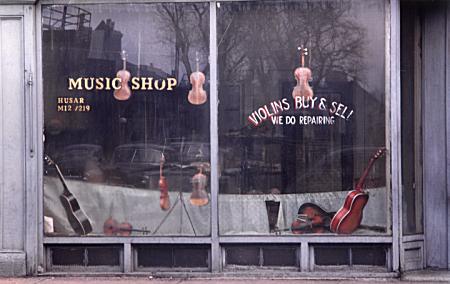
Harry Callahan
c.1955
1 2 3
_______________________
Pierre Joris: «An “E” for an “A”
1995
jacket
(....)Turning away from Europe and even its languages, & thus from my so-called mother tongues - there, too, resides a matter relating to Celan I have addressed elsewhere - I began to write in English at that time, or rather in American English. The US beckons. And it will be a call for air, an in-spiration, even a sort of Atemwende. And it is there that the "Sprech" of my grille will find fulfillment, because if the "Sprachgitter" of Celan is based on the noun, Sprache, language, thus on the language matter, my "Sprechgitter" relates to the verb "sprechen," and therefore to the act of speaking, to the voice. Which allies my SPRECHGITTER with an American poetics of action, of the verb, of spoken language as a base for writing. Without, however, returning to a tritely romantic, phonocentric lyricism, that would revolve around the lyrical subject in action. The critique of that particular subject was already contained in Charles Olson's text "Projective Verse," dating back to 1950 - and which can be seen as a founding text of what was later to be called the new American poetry. There, Olson speaks of the necessity of "getting rid of the lyrical interference of the individual as ego, of the "subject" and his soul, that peculiar presumption by which western man has interposed himself between what he is as a creature of nature (with certain instructions to carry out) and those other creations of nature which we may, with no derogation, call objects."
No doubt this American poetics would have appeared as somewhat strange to Celan - at least in and through its optimism. Because there is another way of reading the sprech/sprach -gitter distinction. ...(more)
Marginalalia: On Pierre Joris Justifyingcurrently unfolding at Jacket 40
_______________________

detail
Jan van Eyck
1434
.....................................................
Van Eyck's "Miracle of Composition":
Ante-Deleuzian Crystals of Space/Time in the Arnolfini Portrait
John Freeman
ctheory
The numerous revisions of gestures, glances, and perspectives constituting the underpainting of van Eyck's masterpiece have been recovered by infrared reflectograms that reveal a mute symphony of pentimenti: Arnolfini's hand flutters through the stages of its composition; like images on badly spliced film, the two figures' eyes flicker through their adjustments; the wire-haired dog floats like a fuzzy electron cloud in the process of materializing in front of our eyes. The reworked mirror itself seems cognate with the artist's shifting intentions as it draws the composition into focus. A "restoration" in reverse, moving backward in time from finished product to earlier stages of composition, this process espies a hidden narrative teased out of the underdrawing's hatching and overlapping lines. This previously undisclosed narrative, realized through processes of interference and superposition, offers valuable clues as to the artist's physical planning and execution of the final image. A painting on view for over five hundred and seventy-five years suddenly has a new story to tell. ...(more)
_______________________

Taxi
Saul Leiter
1956
1 2
_______________________
HOHENBURG
Georg Trakl
translated by Daniele Pantano
No one is in the house. Autumn in rooms;
Moon-bright sonata
And the awakening at the edge of the twilight forest.
You always think the white face of mankind
Far from the turmoil of time;
Green branches bend willingly over something dreaming,
Cross and evening;
The sounding one is enfolded by the purple arms of his star
Which climbs to uninhabited windows.
So the stranger trembles in the dark,
For he softly raises his eyelids over something human,
Which is far away; the silver voice of the wind in the hallway.
MAYDAY 2
_______________________

The Grass Roofs of Norway
via boingboing
|
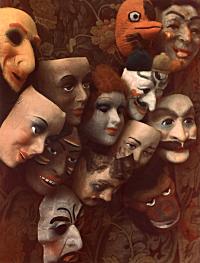


 Janus Head
Janus Head

 The Age of Briggs & Stratton
The Age of Briggs & Stratton




























































